12. GLORY

THE RISING SPIRIT OF NATIONALISM
CONTENTS
 The French Second Empire The French Second Empire
 The Founding of the Italian Nation-State The Founding of the Italian Nation-State
(the Risorgimento)
 Bismarck and the New Germany Bismarck and the New Germany
 Victorian England Victorian England
 Tsarist Russia Tsarist Russia
 The American Civil War ... but The American Civil War ... but
subsequent rise to industrial greatness
 The Third Republic of France The Third Republic of France
The textual material on page below is drawn directly from my work
A Moral History of Western Society © 2024, Volume Two, pages 1-25.
|
Louis Napoleon (Napoleon III)
Although Louis Napoleon was the nephew of the great Napoleon Bonaparte,
he was very different from him in temperament ... and ability.
Yet the name Napoleon was what brought him to his position of French
leadership ... and what forced him to move in directions that he was
really not able to manage successfully. He did his best when he
did little.
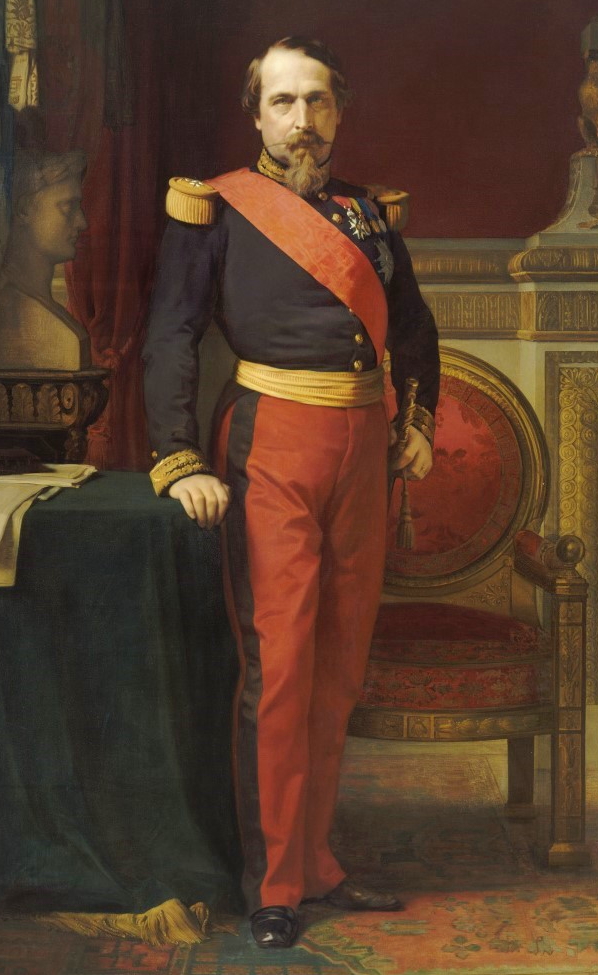
Because of the growing disillusionment among the middle and working
classes of France with their "citizen king" Louis-Philippe, a highly
romanticized cult of Napoleon (and thus things Napoleonic) began to
infect France during the 1840s. When Napoleon’s son died in 1832
(Napoleon II), the Bonapartists looked to Louis Napoleon to take the
lead. Being an individual with a love for the dramatic, Louis
Napoleon was more than happy to do so ... in 1836 and then again in
1840 attempting to overthrow the government of Louis-Philippe by
military action. Both efforts failed ... resulting in his brief
banishment in the first instance and his imprisonment in the
second. But while in prison he was active writing political
tracts which kept the Bonapartist dream alive. Then in 1846 he
escaped prison by disguising himself as a prison worker, fleeing
through Belgium to London ... where he waited for a new opportunity to
arise.
In 1848, with Louis-Philippe's abdication, that moment had
arrived. He moved immediately to France, but let Bonapartists
open the doors for him politically ... being elected to multiple seats
in the new (Second) Republic’s National Assembly. His name was
then put forward for the Presidency ... in which he was up against only
the conservative candidate, General Cavaignac, who had fired on Paris
protesters when Louis-Philippe was first in trouble. By a 5 to 1
margin, the popular vote in December (1848) went to Louis Napoleon as
the Republic’s new president.
The birth of the Second Empire
But once in office Louis Napoleon began to move on his dream of being
head of a restored Empire. The conservative majority in the
Assembly (which disliked the populism of Louis Napoleon) did the job
for him, passing voting restrictions which in essence took the vote
away from a third (the working classes) of the voting population.
Napoleon played on the anger of the lower classes by touring the
country and holding public meetings among the adoring masses. He
then challenged the Assembly to restore the votes to those taken off
the roles, which the Assembly refused to do ... giving the appearance
of Louis Napoleon as being the true champion of the people.
He was by this time ending his four-year term limit as president and
knew it was time to act. On the night of 1-2 December (1851) he
had officers arrest a large number of civil and military opponents and
awakened France the next morning to the news that the Assembly had been
dismissed, universal suffrage restored, and a new constitution was in
the making, one which would give the president (himself) virtually all
governing powers for a term of ten years.
The reaction to the news in Paris proved to be timid ... though
resistance in the French countryside was substantial. Then on
December 21, the French voted an overwhelming approval of the new
constitution ... and a year later also voted overwhelmingly to
re-designate the head of the country as Emperor rather than
President. And thus the French Second Empire was born (December
1852), with Louis Napoleon as Emperor Napoleon III.
 For more on Louis Napoleon For more on Louis Napoleon
|
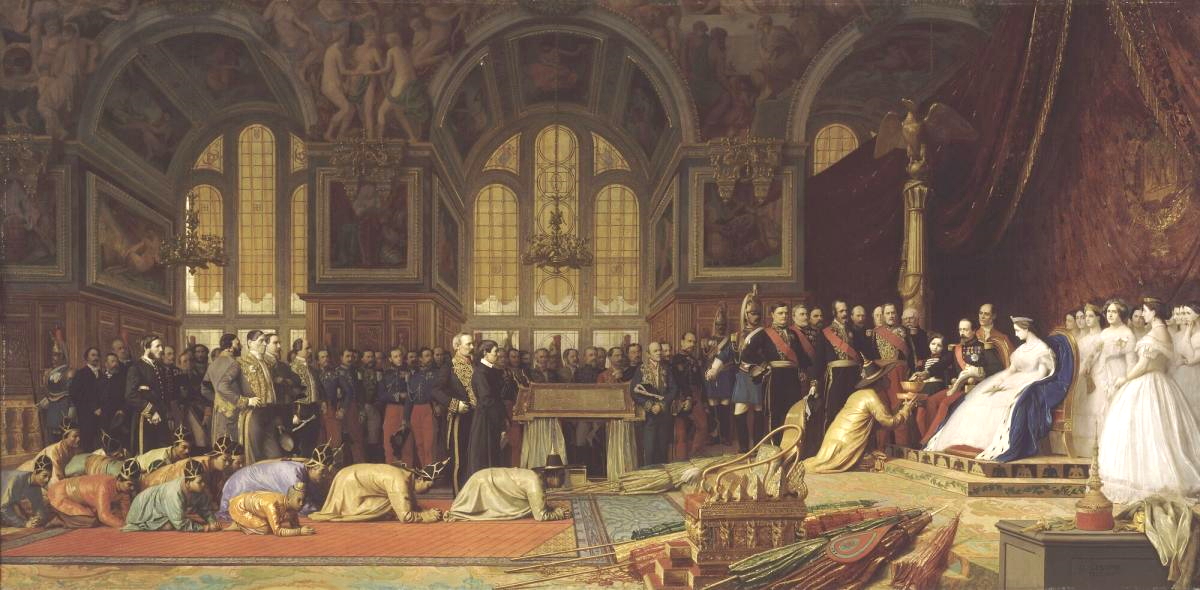 Napoleon III - French Emperor - Versailles Palace - December 1852
Napoleon III - French Emperor - Versailles Palace - December 1852
|
The glory years
The amazing prosperity that followed in the next years settled the
French into a political calm not experienced in a long time. New
commercial banks were founded, canals dug, railroads laid out, and
steamships added to the French commercial fleet. The emperor and
his Spanish wife Eugénie were active in improving and increasing the
health, safety and nurture (hospitals, orphanages, convalescent homes)
of the French working class. The Paris capital was rebuilt
extensively by Baron Haussmann with new and elegant public and private
buildings, tree-lined boulevards, parks, bridges, public buses, a new
water system, sewers, paved streets, gas street lights, etc. ...
turning Paris into the most elegant city in the world.
The Crimean War (1854-1856)
Being a Napoleon, of course, the emperor could not avoid even in his
own mind being compared to his famous uncle, the fabled general of
old. Louis Napoleon felt compelled to measure up somehow.
And that meant military action in some form or other.
He
soon found his opportunity when Tsar Nicholas began pressuring the
Turkish "Sick Man of Europe" (the Ottoman sultan) to have himself named
as "Protector" of the Christian subjects and Christian places of
pilgrimage inside the Ottoman Empire. Napoleon saw this as a move
to replace Catholic supervision with Orthodox supervision ... and the
British saw this as simply a ploy of the Russian Tsar to seize land in
the Balkan Peninsula ... and even along the Mediterranean coast if
possible. Thus both France and Britain (and the smaller Italian
Kingdom of Sardinia-Piedmont) moved to support the Turkish sultan
against Russian aggression. When the Tsar moved Russian troops
into Moldavia and Wallachia, the allies responded with their own
counter-move against Russia (March 1854). Actually the Turks on
their own managed to turn the Russians back when they attempted to
march on Constantinople (Istanbul) ... and it looked as if the matter
had resolved itself as a standoff.
But the British were not content to let it end there, and decided to
carry the war to the Russians, in particular to Sevastopol in the
Crimea where a Russian naval fleet was based. The British wanted
to end any possibility that the Russians might get into a position to
challenge the British domination of the Eastern Mediterranean ... where
British commerce had to pass to reach India and the huge British
interests there. Thus the allies combined forces and landed about
60,000 troops in Crimea in order to seize the Russian naval base.
But they wasted valuable time getting moving once on land, allowing the
Russians to move their own troops into a strong, defensive
position. Thus the attack stalled ... and at Balaclava the attack
even turned into a grand disaster for them.1
Then a hard winter – for which the allies were totally unprepared – set
in, creating even more anguish and death than had the guns of the
Russians.
Fighting resumed the next spring, but it was not until September
that the Russian fortress at Sevastopol was finally taken by the
allies. Nonetheless the war dragged on through another winter ...
until finally in early 1856 the Russians called for a peace
settlement. The allies wisely accepted the request, for their own
citizens were tiring greatly from a war that seemed to yield nothing
but dead and wounded. Thus the powers gathered in March to sign
the Treaty of Paris (March 1856).
Overall, the war cleared the Black Sea of a Russian navy ... at least
for a while. It undercut the great power status of
Russia. It shattered the basic unity that had characterized
the Concert of Europe, not only isolating Russia among the Big Five
powers of Europe, but also undercutting Austria ... which had failed to
come to the aid of its formerly close ally Russia. Smarting from
this Austrian betrayal, Russia would return the snub when Austria found
itself in trouble, particularly in the face of a rising Prussian power
to the north in Germany. Also, although the Ottoman Empire came
out on the "winning" side, it clearly revealed that it did so only
because of the support of England and France. Indeed, it
highlighted the Ottoman Empire as the "Sick Man of Europe" ... inviting
various ethnic minorities in the Empire to begin to push for their own
national autonomy within, even independence from, the Ottoman Empire.
Yet most importantly for Louis Napoleon, it restored France to the
status of being the strongest continental power in Europe. It was
thus at this point that Emperor Napoleon III reached the height of his
popularity at home and glory abroad.
1This
was the event that inspired the English Poet Laureate Alfred Lord
Tennyson to write his famous poem, "The Charge of the Light Brigade."
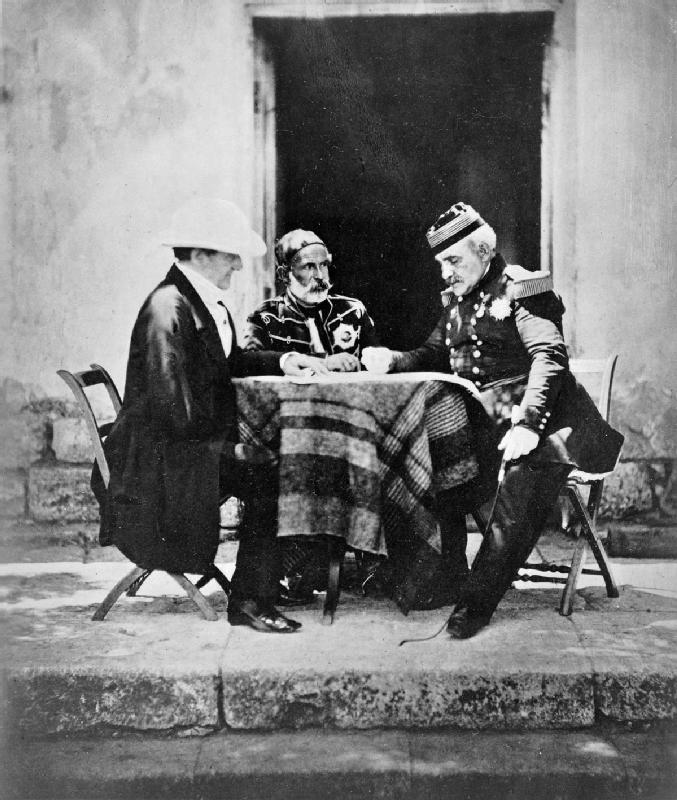
British Commander Baron Raglan, Turkish Commander Omar Pasha, and
French Marshall Pelissier conferring during the Crimean War - 1854-1856
Interestingly,
Omar Pasha was born as Mihajlo Latas to a Serbian Christian military
family ... but in 1823 escaped to the Ottoman Empire to avoid a
corruption scandal, converted to Islam, then led Turkish troops in
putting down various Christian rebellions against Ottoman authority. During the Crimean War, he
led Turkish forces to victories against the Russians in the Danubian
provinces ... and also commanded the Turkish forces at the Siege of
Sevastaopol.
|
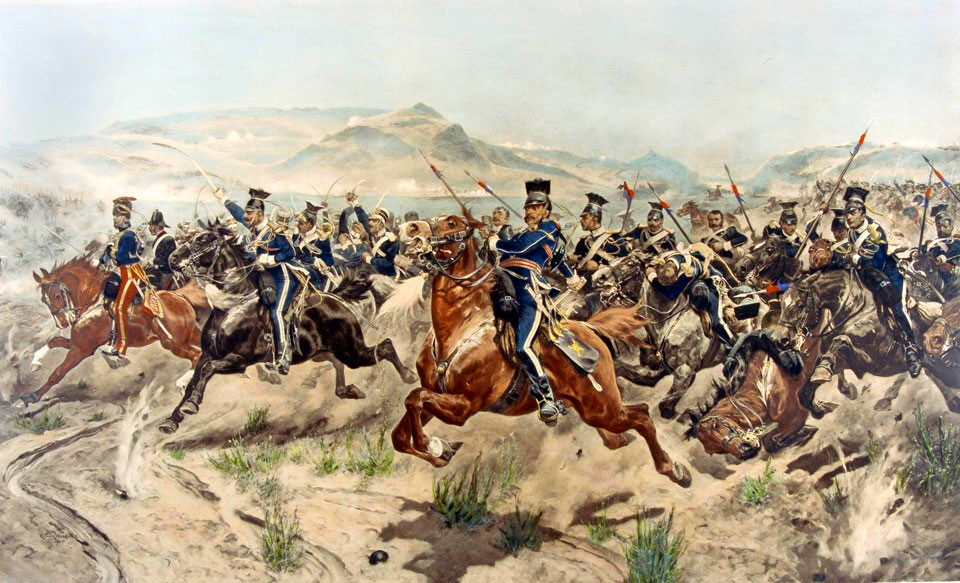
The Charge of the Light Brigade - by Richard Caton Woodville, Jr. (1894)
| Alfred Lord Tennyson would commemorate the event (December 1854) with the famous line "Into the valley of Death Rode the six hundred. " The neary suicidal charge against the canon and guns of the Russians at the Battle of Balaclava (October 25, 1854) resulted in the death and wounding of 40 percent of the British cavalry. |
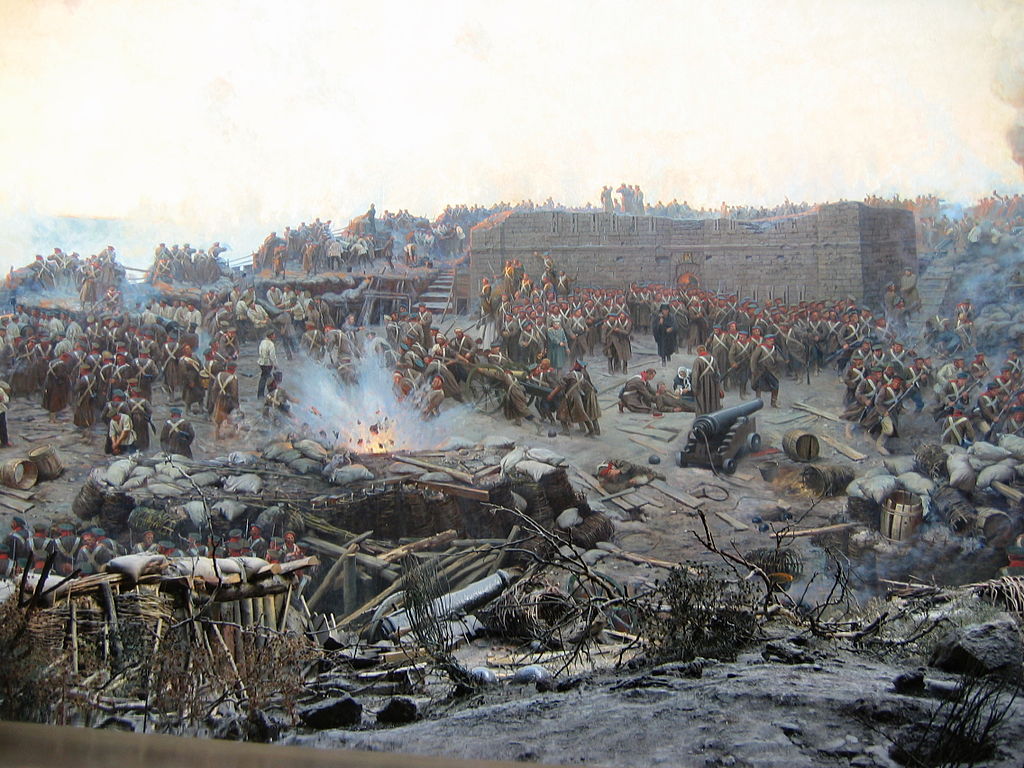
The Russians defending Sevastapol against a British and French assault - 1854-1855 - by Franz Roubard
THE FOUNDING OF THE ITALIAN NATION-STATE
(THE RISORGIMENTO) |
Since
the fall of the Roman empire "Italy" was more a geographic designation
on a map of Europe than an actual political entity. Italy – like
Germany – was made up of a number of small but very independent states
... including the Pope’s own Papal States. Being so divided,
Italy was thus easy prey for the larger powers of Europe, Spain and
France ... joined eventually by Austria.
Italy got caught up in the political turmoil of the French Revolution,
especially when in 1796 Napoleon Bonaparte brought his French army into
the region and established something of a Republic which briefly
included most of Italy ... until a peasant reaction in Napoleon’s
absence returned Italy to its former status quo (including the
restoration of the Papal States and Austria’s dominance). But
once Napoleon took full power in France he returned to Italy (1800) and
brought quickly most of northern Italy again under French
control. He established in 1805 the title of "King of Italy" and
then had his troops seize the southern Kingdom of Naples (1806), adding
it to the Italian kingdom. In 1809 he completed the unification
of Italy by seizing Rome and the Papal States. At this point,
whether they were for or against Napoleon, Italians clearly understood
the importance – and the possibilities – of a unified Italian state.
When Napoleon was finally overthrown in 1815, Italy was divided into
nine states ... and efforts were made by Metternich and the ‘Big Five’
of Europe to restore Italy to its pre-Napoleonic social-cultural
status. But young Italians had little love for this
situation. Secret societies were formed, chief among them the
Carbonari, for the purpose of instituting a unified Italian state – by
force if necessary. But failed uprisings in 1820 and 1831 brought
great discouragement.
Nonetheless they persisted. And by the mid-1800s it appeared that
the possibilities of a unified Italian state hinged greatly on the
efforts of three key individuals: Giuseppe Mazzini, Count Camillo di
Cavour, and Giuseppe Garibaldi (with Victor Emmanuel II also important).
Mazzini
 The young and energetic intellectual Mazzini, with strong republican
loyalties, was imprisoned in 1830, escaped, founded from his exile in
France an organization called Young Italy (1832) which spread rapidly
in membership and reach in Italy. He wrote countless pamphlets
brought secretly into Italy, outlining the noble nature of a
"Risorgimento" ("resurgence" or "rising again') ... involving the
political unification of all Italy. Thus it was that he himself
became something of its "soul" in the process.
The young and energetic intellectual Mazzini, with strong republican
loyalties, was imprisoned in 1830, escaped, founded from his exile in
France an organization called Young Italy (1832) which spread rapidly
in membership and reach in Italy. He wrote countless pamphlets
brought secretly into Italy, outlining the noble nature of a
"Risorgimento" ("resurgence" or "rising again') ... involving the
political unification of all Italy. Thus it was that he himself
became something of its "soul" in the process.
His cause was naturally opposed by others – those wanting a national
monarchy rather than a republic ... and those who wanted an independent
but federal Italy of unified states under the authority of the
pope. Indeed when the liberal-minded Pius IX took the papal
position in 1846 this seemed to be the most likely path that Italian
independence would take... until the huge support of many Italians for
the ideals of the 1848 revolutions sweeping Europe shocked the
pope. Pius was bitterly opposed to such democratic or republican
instincts and turned himself into a full reactionary.
Cavour ... and the Kingdom of Sardinia-Piedmont
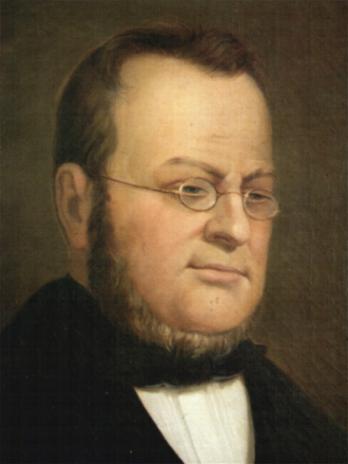 The uprisings of 1848 indeed brought movement, at least briefly, toward
the ideals of Mazzini and Young Italy. All through northern Italy
the Austrians and their local colleagues were driven from power, and at
first the rulers of Tuscany and Naples – and the pope – joined in
support of this nationalist movement. But strong disagreements as
to what direction Italy was to take next crippled the movement, and
Naples and the Papal States pulled out of the movement
altogether. This left only the liberal-minded King Charles Albert
of the Kingdom of Sardinia-Piedmont to continue the battle as the
Austrians and their colleagues regained their positions in northern
Italy. By 1849 the Austrians had defeated Charles Albert and his
smaller army ... and the effort on behalf of Italian independence
seemed to have come to an end. But the Italian hopeful would not
forget the sacrificial effort of Sardinia-Piedmont in support of the
cause.
The uprisings of 1848 indeed brought movement, at least briefly, toward
the ideals of Mazzini and Young Italy. All through northern Italy
the Austrians and their local colleagues were driven from power, and at
first the rulers of Tuscany and Naples – and the pope – joined in
support of this nationalist movement. But strong disagreements as
to what direction Italy was to take next crippled the movement, and
Naples and the Papal States pulled out of the movement
altogether. This left only the liberal-minded King Charles Albert
of the Kingdom of Sardinia-Piedmont to continue the battle as the
Austrians and their colleagues regained their positions in northern
Italy. By 1849 the Austrians had defeated Charles Albert and his
smaller army ... and the effort on behalf of Italian independence
seemed to have come to an end. But the Italian hopeful would not
forget the sacrificial effort of Sardinia-Piedmont in support of the
cause.
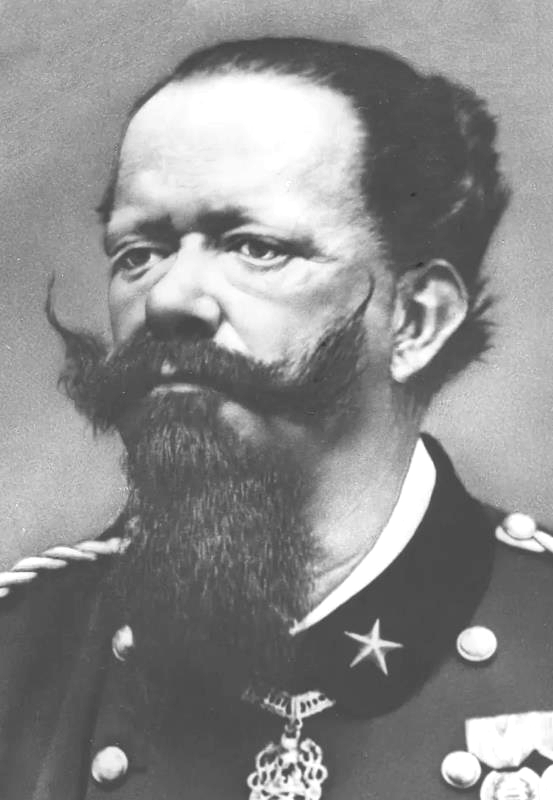 A tired Charles Albert turned his throne over to his son, Victor
Emmanuel II (1848), who continued his father’s liberal policies.
Best of all, he had the wisdom in 1854 to pick as his prime minister the highly
capable Cavour. Cavour understood that Italy’s destiny was
closely connected to Sardinia-Piedmont’s leadership and immediately set
himself to the task of building up the social muscle (industrial,
commercial, military) of the kingdom. He also understood the
importance of diplomatic connections ... and thus engaged
Sardinia- Piedmont fully in the Crimean War as ally with France and
Britain. Cavour even sent his attractive cousin, the Countess
Castiglione, to woo (successfully) Napoleon III.
A tired Charles Albert turned his throne over to his son, Victor
Emmanuel II (1848), who continued his father’s liberal policies.
Best of all, he had the wisdom in 1854 to pick as his prime minister the highly
capable Cavour. Cavour understood that Italy’s destiny was
closely connected to Sardinia-Piedmont’s leadership and immediately set
himself to the task of building up the social muscle (industrial,
commercial, military) of the kingdom. He also understood the
importance of diplomatic connections ... and thus engaged
Sardinia- Piedmont fully in the Crimean War as ally with France and
Britain. Cavour even sent his attractive cousin, the Countess
Castiglione, to woo (successfully) Napoleon III.
Now, in alliance with France, Cavour was ready to move against Austria
in northern and central Italy. He cleverly drew Austria into
declaring war (1859) to which France and Sardinia-Piedmont responded by
routing the Austrian forces at Magenta and Solferino (June).
Then, just as Austria was about to be run out of Italy, Napoleon III,
seeing his own armies badly bloodied by the action, decided to conclude
his own separate armistice with the Austrian Emperor Franz Joseph,
ignoring his promise to Victor Emmanuel to fight until Austria was run
out of all of Italy. However, in its treaty with France, Austria
ceded much of its holdings in northern Italy to Sardinia-Piedmont ...
but was allowed to keep Venice and its large holdings in the northeast.
While this was a cruel blow to Cavour ... it was also a hugely foolish
move on Napoleon’s part. Napoleon did get the regions of Nice and
Savoy added to France (given up by Sardinia-Piedmont as part of the
deal). But his actions so strongly in favor of Austria raised
questions about his reliability as an ally and as a player in Europe’s
diplomatic games. It also seemed in the eyes of liberal French to
be a betrayal of the hope of a spread of liberal political philosophy
to the rest of Europe ... and to Italy in particular. And on the
other hand the alliance with Cavour, and his clear goal of absorbing
all of Italy (including the Papal States) into a liberal Italy,
alienated Napoleon III from the strongly Catholic instincts of the
French countryside. His Italian policy would thus mark the
beginning of Napoleon III’s political decline.
For Cavour however, things worked out better. Inspired by his
actions, a number of Italian states in northern Italy took the
initiative themselves in 1860 to oust their Austrian overlords and
declare their union with Sardinia-Piedmont.
Garibaldi
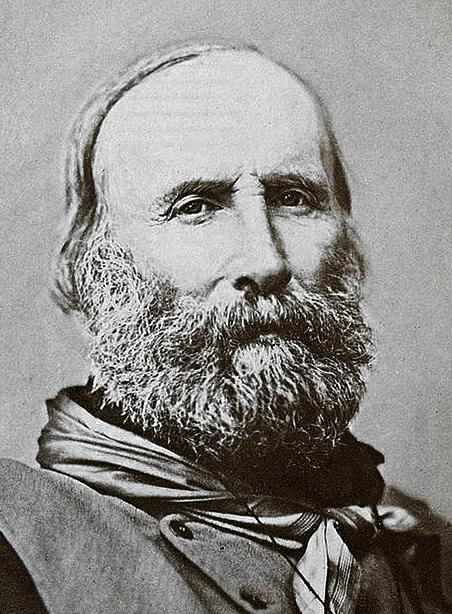 At the same time (1860) activity of the same nature was stirring in the
south of Italy. At its head was the adventuresome Garibaldi, a
long-time rebel in favor of political liberalism, who had escaped to
South America after a failed uprising in Genoa in 1830 and there
learned the art of guerrilla warfare. He returned in 1847 in time
to participate in the 1848 uprising, put down by Napoleon III, which
forced him to flee Italy a second time. He made a small fortune
in America and returned to live on a small island off the coast of
Sardinia in 1854. Then when in 1859 things began moving again in
the form of a revived Italian nationalism, he organized in Naples a
small army of ‘Red Shirts’ and in 1860 moved them to Sicily and then,
accompanied by Victor Emmanuel, to Naples to end the Bourbon Kingdom of
the Two Sicilies ... and bring the region into union with Victor
Emmanuel’s kingdom. In 1861 a new Italian national parliament
then met at Turin to organize the new Kingdom of Italy ... and put it
to a vote of the Italian people. By an overwhelming majority, the
Kingdom and its constitution ... and Victor Emmanuel as its king ...
were approved by the people.
At the same time (1860) activity of the same nature was stirring in the
south of Italy. At its head was the adventuresome Garibaldi, a
long-time rebel in favor of political liberalism, who had escaped to
South America after a failed uprising in Genoa in 1830 and there
learned the art of guerrilla warfare. He returned in 1847 in time
to participate in the 1848 uprising, put down by Napoleon III, which
forced him to flee Italy a second time. He made a small fortune
in America and returned to live on a small island off the coast of
Sardinia in 1854. Then when in 1859 things began moving again in
the form of a revived Italian nationalism, he organized in Naples a
small army of ‘Red Shirts’ and in 1860 moved them to Sicily and then,
accompanied by Victor Emmanuel, to Naples to end the Bourbon Kingdom of
the Two Sicilies ... and bring the region into union with Victor
Emmanuel’s kingdom. In 1861 a new Italian national parliament
then met at Turin to organize the new Kingdom of Italy ... and put it
to a vote of the Italian people. By an overwhelming majority, the
Kingdom and its constitution ... and Victor Emmanuel as its king ...
were approved by the people.
his
left the question of Venice (still under the Austrians) and the status
of Rome and the Latium region unanswered. Wars elsewhere would
soon provide the answers. When in 1866 Prussia defeated Austria
in a struggle over German leadership, Austria was forced to give Venice
(and the entire region of Venetia) over to the new kingdom of Italy as
part of the peace agreement. Then when Prussia engaged France in
war in 1870, Napoleon III was forced to pull his troops out of Rome,
and the Pope lost his military protector. This allowed Victor
Emmanuel then to hold an Italian plebiscite on the matter, with a
majority of Italians voting in favor of attaching both Rome and Latium
to the Italian Kingdom. This then allowed him to seize Rome and
make it his new capital city, minus a very small area inside of Rome
left to the Papacy – "Vatican City."
Thus it was that the Italian dream had just been fulfilled. The
Italians now had their own kingdom, with Rome as its grand capital.
Pius IX (pope 1846-1878) fights back.
The huge political loss by Pius of the Papal States to the new Kingdom
of Italy turned him from something of a social Liberal to a very
conservative – most would even say highly reactionary – Catholic
leader. He excommunicated the Italian King Victor Emmanuel and
the rest of the Italian political leadership for how they had
terminated the Church's ability to carry out its long-standing
responsibilities.
But at least the loss freed Pius to turn his attention to strictly
religious matters, although he – and the popes that would follow for
the next half century – remained deeply opposed politically to the new
Italian state ... and would denounce it at every opportunity.
Early on Pius knew how to reach the hearts of Catholics everywhere –
whether they be Italian, Spanish, Polish, Irish, German, Austrian,
Belgian, French, American etc. – with his efforts in 1848 to elevate,
through a papal encyclical, Jesus's mother Mary to the status of being
totally sinless, most notably untouched by sexual intercourse,2
having brought forward the Christ Child through a process of
"immaculate conception." And being thus sin-free (from birth to
death) she was herself well-situated to be sought devotedly for divine
intercession on behalf of a confessing sinner.
However, this in turn raised the question: does the pope have the
right to decide such theological matters through the simple means of
papal encyclicals – of which Pius had been issuing many? Thus in
1869 a council (the First Vatican Council) was called to decide the
matter. And indeed it did. When the Council concluded its
work the following year, it had confirmed very strongly the doctrine of
"papal infallibility." The pope's words issued ex cathedra
carried the full weight of Catholic Truth in all matters of faith and
morals. Period.
But would this bold step forward of Catholic authority hold back the growing Secular trend clearly overtaking the West?
And what about the rising spirit of nationalism? National
loyalties were clearly growing ever-stronger than traditional Christian
loyalties. True, Westerners continued to identify themselves as
"Christians." But what they truly seemed ready to stand on – and
even die for – was their identities as Italians, Spanish, Polish,
Irish, etc. Christian loyalties by no means held anywhere near
the same position in the hearts of Westerners that rising national
loyalties now did.
2This
inevitably raised the old question: who exactly then were the
brothers and sisters of Jesus mentioned in Scripture (Mark 3:31-35,
Mark 6:3, Galatians 1:19, etc.)?
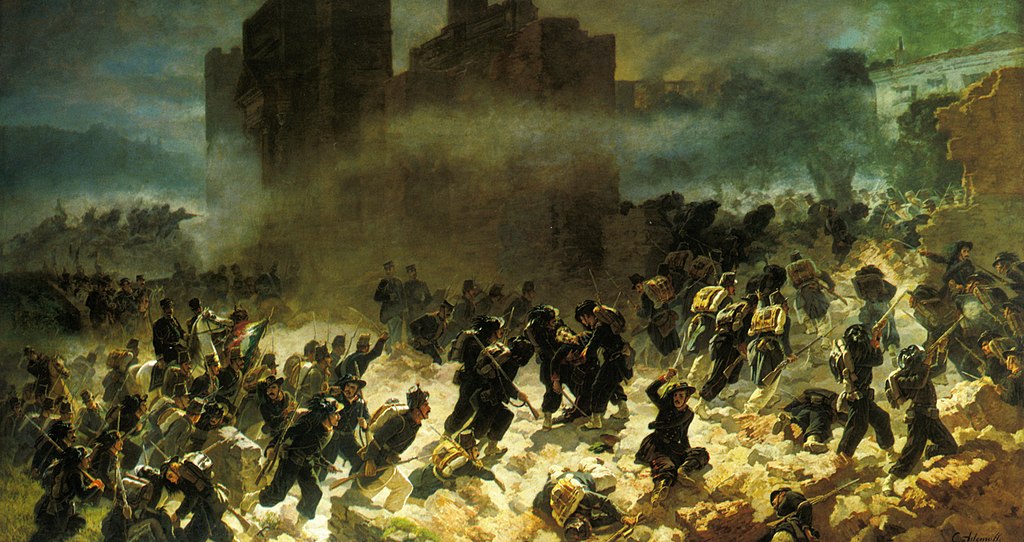
Victor Emmanuel's troops forcing their way into Rome - September 20, 1870 -
by Carlo Ademollo (1880)
Museo del Risorgimento - Milan
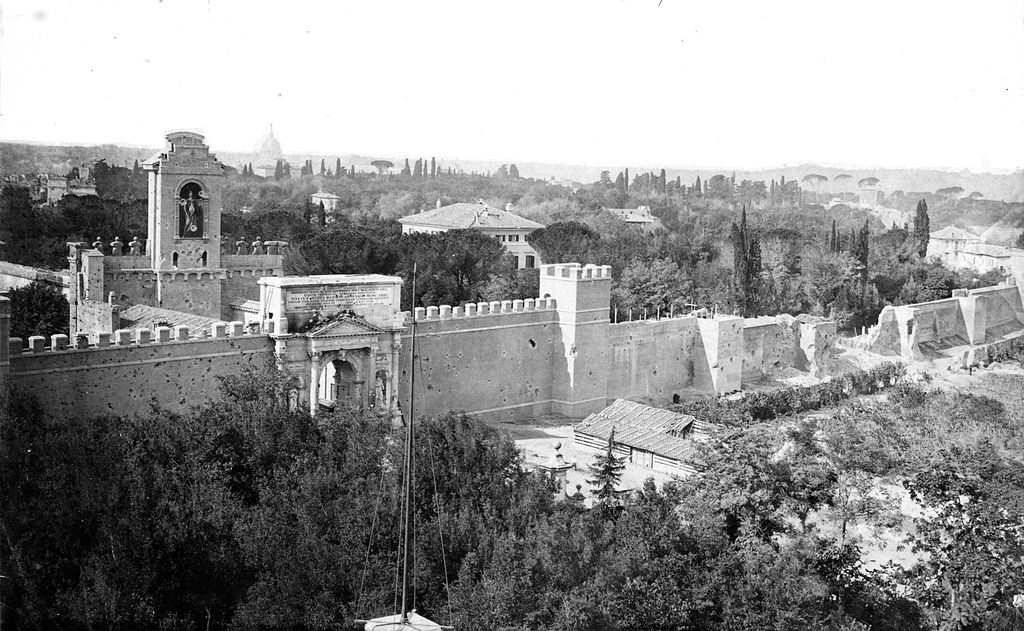
A photo of the breach in Rome's Aurelian walls where Victor Emmanuel's troops entered Rome
BISMARCK AND THE NEW GERMANY |
|
The Zollverein
As Italy had formerly been, Germany had long been more a geographic
designation on the map of Europe than a single society.
Linguistically the German language (in the form of many quite distinct
dialects) had been something of a unifying factor ... thanks in great
part to Luther’s German Bible. But politically, Germany had long
been split into a multitude of competing German states large and small
... some 300 of them! Napoleon had forcibly consolidated this
vast number into 39 German states ... a configuration that was retained
even after Napoleon’s defeat. But that meant that in the early
1800s there were still 39 German states continuing to compete
politically and economically, crippling German power.
A move towards union occurred when after the Napoleonic wars Prussia
started to liberalize the tariffs among the German states ruled by the
Hohenzollern king of Prussia. But other German states were
invited to join Prussia in some kind of expanding customs union.
This finally led in 1834 to the creation of a grand customs union or
Zollverein. Initially the Zollverein included 18 states.
Austria was not part of the membership (Austria was unwilling to lower
its high protective tariffs ... and Metternich was opposed to such a
link with Prussia). But over the years other German states joined
... until by the early 1850s Austria was the only German state outside
the Zollverein. Thus Germany was taking shape as a single entity
... at least economically. But such economics easily registered
itself politically.
|
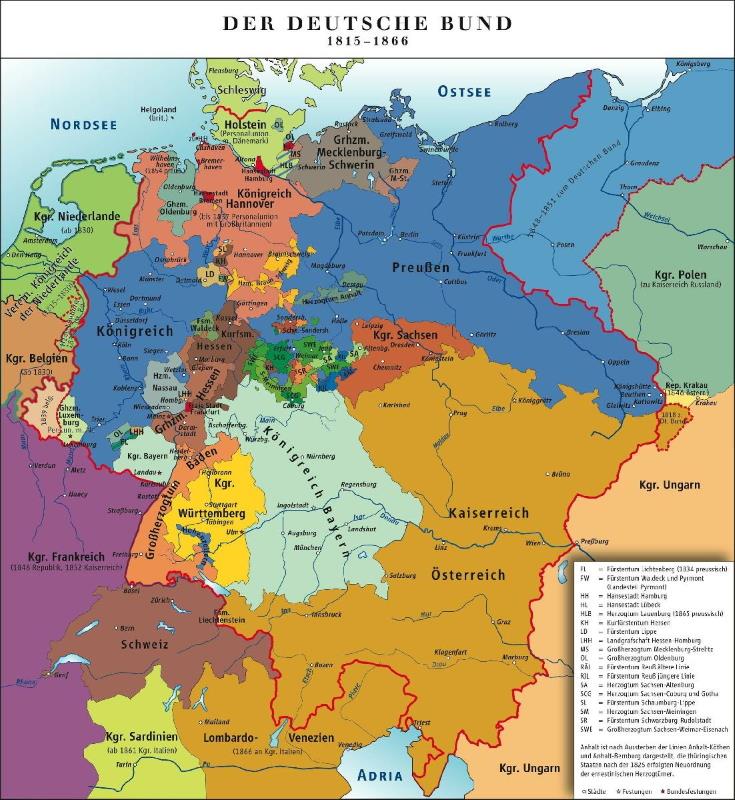
|
Bismarck vs. the German Liberals
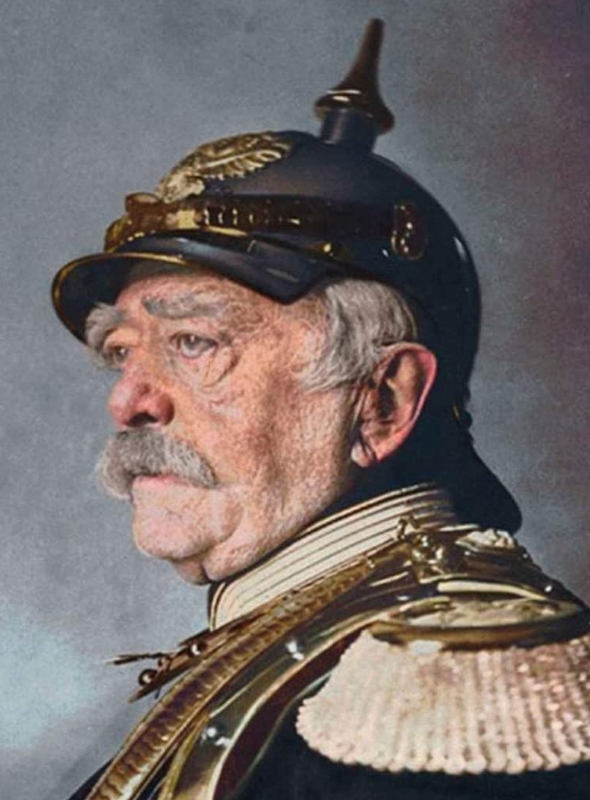 The son of a Prussian Junker (minor nobleman), Otto von Bismarck came
to public attention first as a delegate to the Prussian assembly or
Diet that the Prussian king Frederick William IV (Friedrich Wilhelm IV) had called in 1847 in
response to liberal demands. He stood out from the liberals in
his strong defense of the sovereign rule of the Hohenzollern ... and in
his belief that only the Hohenzollern monarchy had the call to unite
all of Germany. In 1851 he was a Prussian representative to the
Diet of the Austrian-dominated Germanic Confederation where he showed
himself unwilling to bow to the Austrian domination of German
politics. To Bismarck, only Prussia had the makings of true
German leadership. He made his views well known not only to
Austria and the rest of the German world, but also to Frederick
William, whom he regularly consulted with in Berlin.
The son of a Prussian Junker (minor nobleman), Otto von Bismarck came
to public attention first as a delegate to the Prussian assembly or
Diet that the Prussian king Frederick William IV (Friedrich Wilhelm IV) had called in 1847 in
response to liberal demands. He stood out from the liberals in
his strong defense of the sovereign rule of the Hohenzollern ... and in
his belief that only the Hohenzollern monarchy had the call to unite
all of Germany. In 1851 he was a Prussian representative to the
Diet of the Austrian-dominated Germanic Confederation where he showed
himself unwilling to bow to the Austrian domination of German
politics. To Bismarck, only Prussia had the makings of true
German leadership. He made his views well known not only to
Austria and the rest of the German world, but also to Frederick
William, whom he regularly consulted with in Berlin.
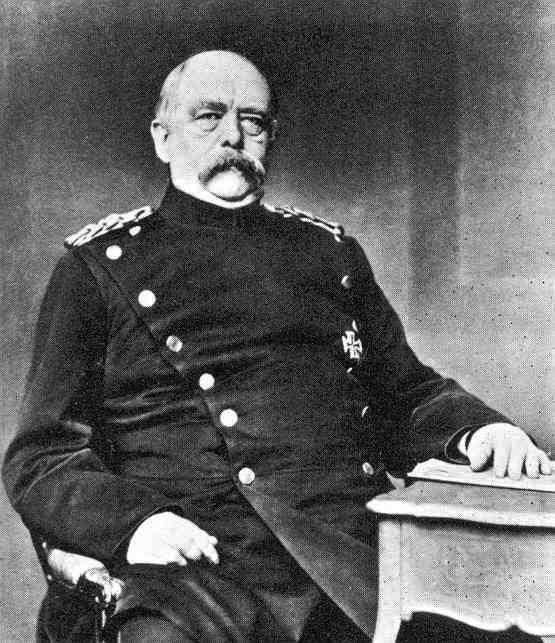
In 1857, when Frederick William was incapacitated by a massive stroke,
his brother William (or Wilhelm) took over Prussian rule as
Regent. But Wilhelm was of a more liberal mind-set and found
Bismarck’s politics so challenging to the prevailing liberal political
mood that in 1859 he sent Bismarck to Russia as ambassador. This
effectively removed a frustrated Bismarck from the unfolding drama
taking place in Italy and central Europe. But Bismarck used his
time "on ice" in St. Petersburg to good effect, learning more about the
intricacies of European diplomacy and building up a relationship with
the Russian court that would later serve him well. He would also
use that time to develop a close political relationship with Prussian
generals von Roon (Prussian Minister of War) and von Moltke (Prussian
Military Chief of Staff). Then in 1862 Bismarck was sent to Paris
as Prussian Ambassador, using his time there to become acquainted with
the personal traits of Napoleon III ... and in a long visit to London,
to familiarize himself with Britain’s chief politicians, Prime Minister
Palmerston, Foreign Secretary Russell and Conservative Party leader
Disraeli.

Friedrich
Wilhelm IV
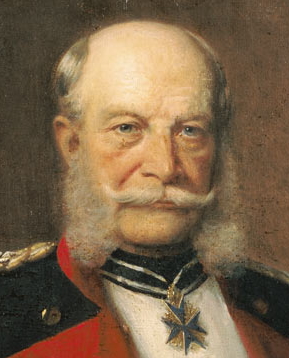
Wilhelm I
The situation in Berlin began to swing in Bismarck’s favor when in 1861
Friedrich Wilhelm died and Wilhelm I became fully Prussian king ... and
found himself increasingly at odds with the Liberals in the Prussian
Diet. A crisis developed in 1862 between Wilhelm and the Diet
when the Liberals refused to fund the strengthening of the Prussian
army. The situation reached a point where Wilhelm was ready to
abdicate, when Bismarck, called to Berlin by Roon, arrived in time to
talk him out of it. At this point Wilhelm was ready to entrust
the strong-willed Bismarck with the position of president of his
ministry (effectively, prime minister or chancellor). Now
Bismarck could get to work building his long-sought united Germany
under Prussian command. With Roon and Moltke at his side,
Bismarck was about to show Europe how the game of politics and
diplomacy is supposed to be played.
With respect to the Liberals’ unwillingness to provide funding for the
military, Bismarck simply ignored the Prussian constitution and
continued to collect taxes on the basis of earlier legislation ...
infuriating the Liberal Diet, which however seemed to have no answer to
the overbearing Bismarck. Bismarck then tightened supervision of
the press, causing him even greater unpopularity. But neither
Bismarck – nor Wilhelm – were slowed up by popular opposition, even
when a new Diet came to office with an even greater Liberal majority.
Ignoring his liberal opposition, Bismarck had moved to strengthen greatly the Prussian military, explaining that:
Germany looks not to the
liberalism of Prussia, but to its power. ... The great questions of the
time cannot be resolved by speeches and parliamentary majorities – that
was the great mistake of 1848 and 1849 – but by iron (Eisen) and blood (Blut).
For the next four years (1862-1866) he was unquestionably the most hated person in Germany. But that was about to change.
|

A meeting of the German Confederation - 1863
|
The Schleswig-Holstein question
and the Austro-Prussian War
(1863-1866)
Bismarck was looking for some pretext to put Austria
to the test before the watchful eyes of the rest of Germany. In
1863 he found his opportunity when Frederick VII of Denmark died ...
and a dispute arose over who should inherit the throne ... and in
particular the Danish duchies of German-speaking Holstein and Schleswig
(the southern half also with a German-speaking population). When
the new Danish king Christian IX moved under a rising spirit of Danish
nationalism to fully annex Schleswig, Bismarck reacted to this insult
to the equally strong spirit of German nationalism and got Austria to
join him (1864) in invading Denmark and forcing Christian to give up
both provinces. Now the question remained of who should get which
of the two duchies. Ultimately (1865) Austria took Holstein and
Prussia took Schleswig.
But, as Bismarck anticipated, Austria began to encourage a German duke
to claim the right to rule the duchies ... giving Bismarck opportunity
to depict Austria as trying to stir up liberal troubles in northern
Germany. Claiming this to be simply a defensive move, Bismarck
ordered his Prussian troops into Austrian-occupied Holstein. The
Austrians resisted ... and Bismarck (with his carefully cultivated
Italian allies moving against Austria in Italy) easily crushed a
divided Austrian army at Königgrätz (or Sadowa).
By this time the Germans had been stirred to intense patriotic
nationalism (and Bismarck had become Germany’s national hero, no longer
its most hated citizen!). But Bismarck played a cool hand by
refusing to let Prussian troops do any more damage to a crushed
Austrian ego. To add further insult to injury, Bismarck was
relatively generous to his defeated enemy, increasing greatly Prussia’s
political stature. In victory Prussia received additional German
lands ... but none taken from Austria. Austria was forced only to
pay a small indemnity to Prussia and to accord full rights to Prussia
in Schleswig-Holstein. However Italy did receive Venetia from
Austria as its reward for allying with Prussia in the conflict.
Austria also had to agree to the dissolution of the German
Confederation – which Austria had long dominated – its place taken by a
new huge North German Confederation – in which clearly Prussia would
dominate (Austria was excluded from membership). According to the
new constitution, member states would retain full sovereignty in
domestic matters. As a federal union it would possess a legislature of
an upper house (Bundesrat) representing the various member states and a
lower house (Bundestag) representing the German voting public.
Also the new North German Confederation would be headed by the Prussian
king, who would also be charged with the conduct of the confederation’s
foreign diplomacy.
The Franco-Prussian War (1870-1871)
Now it was time for Bismarck
to bring the southern German states (still excluding Austria) into his
newly forming Germany. Napoleon III would unwittingly facilitate
that move. Napoleon had been expecting to be a Prussian ally in
the conflict with Austria. He thus expected in compensation the
extension of French territory in the south of Germany all the way to
the Rhine River. But the war was over so quickly that he lost out
on the payoff. He then complained that at least his neutrality
deserved him such a reward. Bismarck tricked him into putting his
demand in writing ... and then showed it to the southern German states,
infuriating them and driving them into Prussia’s arms as protector
against such French ambitions. Now all Bismarck needed was an
event – a French attack on Germany – to spark just those conditions,
and complete the unification of all Germany.
That event was to soon develop around the matter of naming a successor
to the Spanish throne after Queen Isabella was deposed by a Spanish
revolt in 1868. A Hohenzollern Prussian prince Leopold was one of
several possibilities ... causing Napoleon and France deep concern
about a Prussian encirclement from the south and the east. When
Leopold withdrew his name from the list, it looked as if Bismarck was
not going to get the confrontation he was looking for. Napoleon
was content to leave matters at that. But his meddlesome wife
pushed for a Prussian pledge that no Hohenzollern would ever become a
candidate for the Spanish throne. Wilhelm refused the request ...
and then sent a telegram from Ems (where Wilhelm was vacationing) to
Bismarck briefly explaining the event. Bismarck reworked the
telegram a bit, making the French demand appear insulting to German
pride ... and Wilhelm’s reply insulting to French pride. He then
sent the revised Ems telegram for publication in the official
newspaper. It had the desired effect of stirring an already sore French
national pride into full fury ... leading Napoleon and the French
Parliament to declare war in mid July 1870. But the Germans were
now united behind Bismarck and ready to take on their old national foe,
Napoleonic France.
Now appeared the huge differences in levels of political skill
separating Bismarck and Napoleon III. Napoleon was led by the
passions of the French, who believed that their troops would be in
Berlin in a matter of mere weeks. Bismarck was the master of
German opinion, not its servant. Bismarck had over the years
carefully prepared his military for this major super-power
confrontation. Napoleon’s France was unprepared ... its officers,
its equipment, its numbers of trained soldiers. Diplomatically,
Bismarck had carefully laid the groundwork so that France would find
itself isolated when it looked to former allies for help. The
Austrians had been neutralized, not just by the shock of their loss to
the Prussians in their recent war but because they were afraid that the
Russians, who Bismarck had been cultivating as allies, might join any
conflict against them. And Victor Emmanuel’s Italy was now
clearly a Prussian ally, understanding that with France occupied in a
war with Prussia, the Pope would lose French protection ... and thus
the Papal States would be ripe for the plucking by the new Kingdom of
Italy. In short, Napoleon stood no chance of success in any
conflict with Bismarck’s Germany.
It did not take long for German superiority to register itself. A
French army sent out to hit the Germans was itself hit in a series of
battles that within a month had it surrounded (August). A second
French army was sent out to relieve the first French army and it was
surrounded and destroyed (September 2) at Sedan, including Napoleon III
who was captured trying to lead the French attack.
The news of the French defeat at Sedan was the signal for French
politicians in Paris to take charge, to declare a provisional
government or "Government of National Defense" of a new Third Republic
(Napoleon III’s Second Empire had simply vanished). Everyone
expected the French and Germans at this point to meet for
negotiations.
But Bismarck was not finished. He ordered his troops to march on
Paris, which was fully surrounded before the end of the month.
The French were now up in arms all around the country and the war
dragged on. But Paris was soon starving and France was becoming
increasingly chaotic. When in early February (1871) it became
obvious that Gambetta’s French troops would not be able to break the
German encirclement of Paris, the provisional government was finally
forced to surrender.
Europe was shocked ... having expected the famous French army to make
short work of the German army – rather than the opposite. The
results for France were disastrous. As part of the terms of peace
France was required to turn over to Germany the border regions of
Alsace and Lorraine, pay a large indemnity to Germany, and have the
northern half of France occupied by German troops until the indemnity
was paid up. To add further insult to France, a month earlier
Wilhelm had been crowned the Emperor of the new German (Second) Empire
at the Versailles Palace outside of Paris.
|
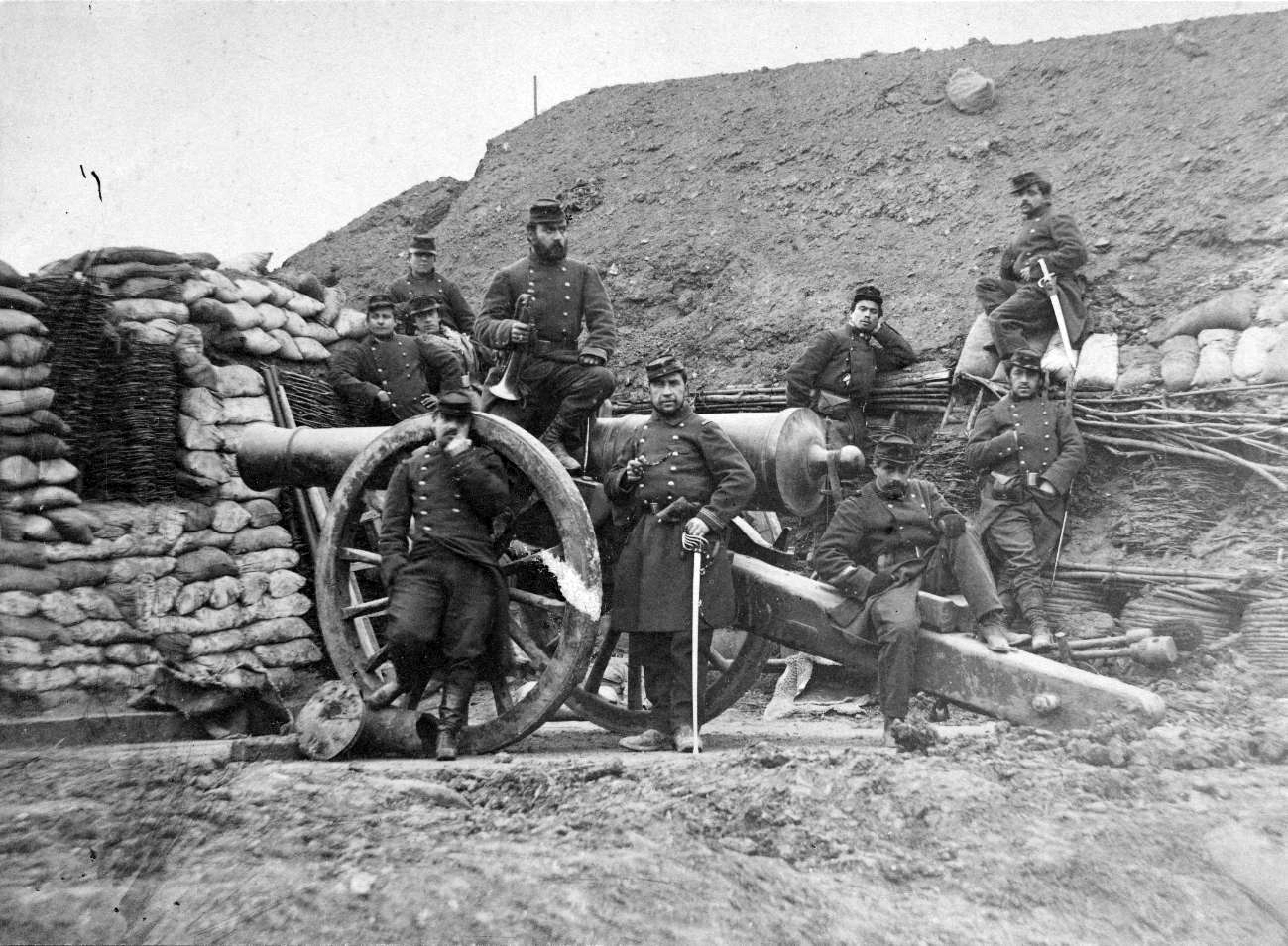
French Soldiers in the
Franco-Prussian War 1870-71
Providence, RI, Brown
University
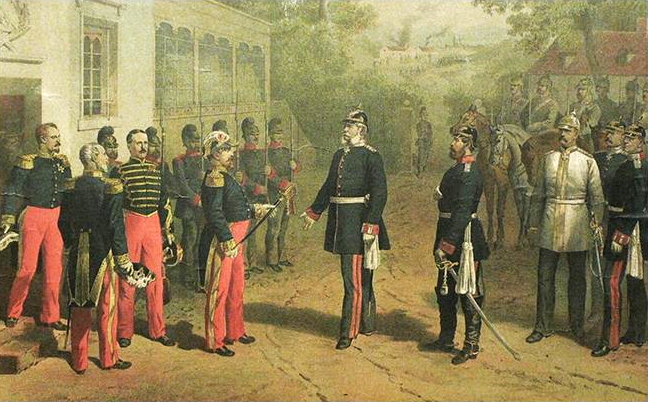
Napoleon III Surrenders to Wilhelm after the Battle of Sedan - September 1870
Sammlung Archiv für Kunst und Geschichte - Berlin
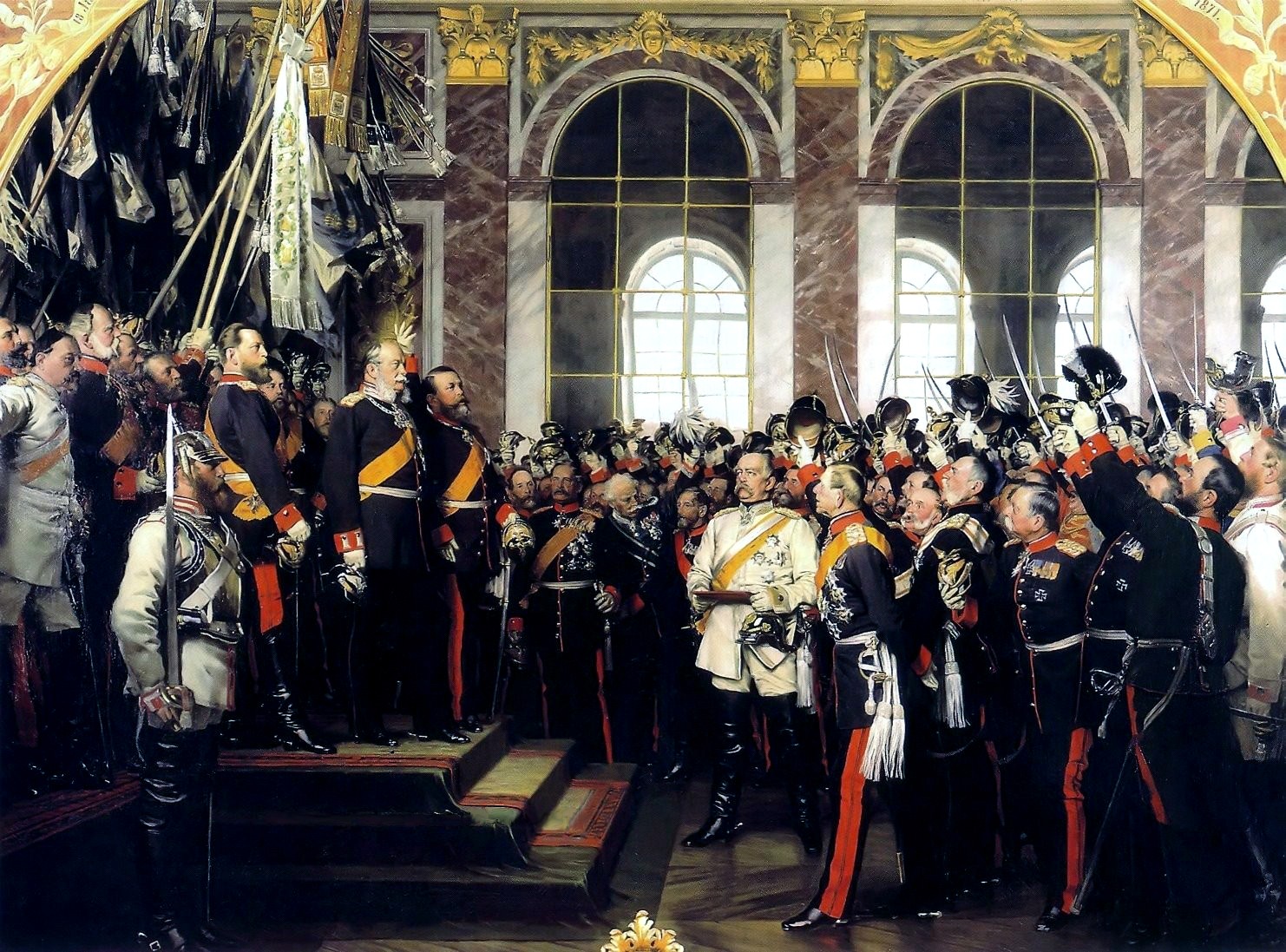
January 1871 - Wilhelm declared Emperor of the new German Second Empire (Reich)
at the Versailles Palace just outside of Paris
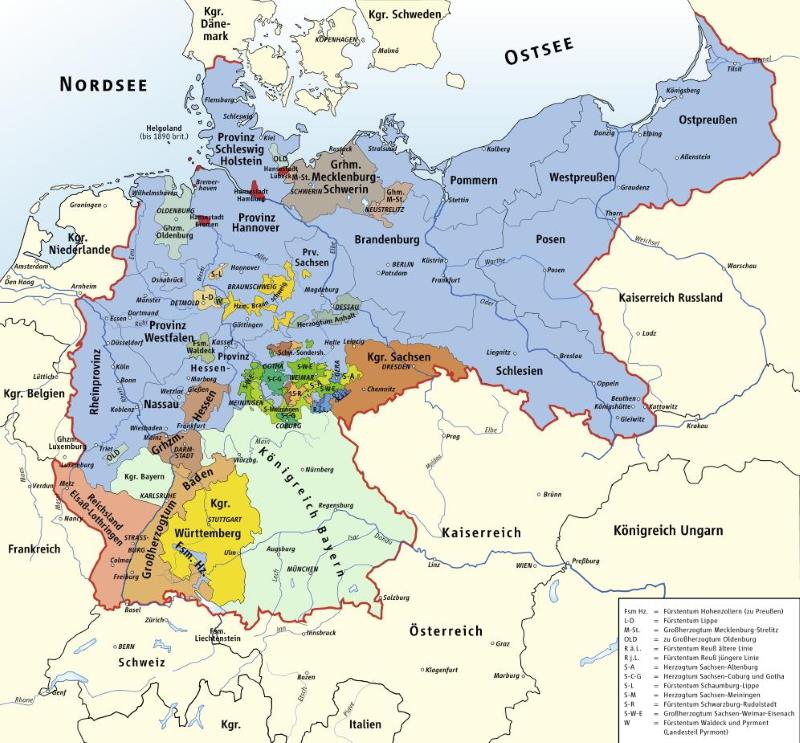
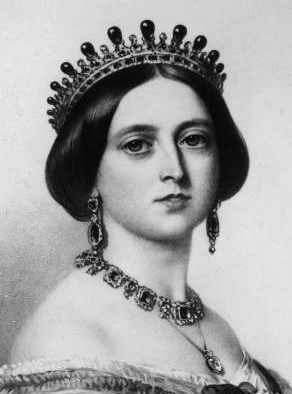 In
1837 an 18-year-old Victoria succeeded to her uncle William IV’s throne
as Queen of the United Kingdom of Great Britain and Ireland. Any
doubts that she would be able to live up to the heavy duties laid on
her by this inheritance were soon dispelled. She was studious in
her approach to problems, devoted to the welfare of Great Britain and
its people and wise in her choice of counselors. Consequently, she gave her people a long reign devoid of the kinds of
turmoil that shook the countries of continental Europe. In
1837 an 18-year-old Victoria succeeded to her uncle William IV’s throne
as Queen of the United Kingdom of Great Britain and Ireland. Any
doubts that she would be able to live up to the heavy duties laid on
her by this inheritance were soon dispelled. She was studious in
her approach to problems, devoted to the welfare of Great Britain and
its people and wise in her choice of counselors. Consequently, she gave her people a long reign devoid of the kinds of
turmoil that shook the countries of continental Europe.
Parliamentary leaders
Several major political figures stood out during this long period of
British politics. In her early years the person who influenced
her most was her German cousin and husband Albert (married in 1840),
who shared her interests, her wisdom and her political skills.
Victoria and Albert - 1854 (the era of the Crimean War)
Also, in
cooperation with whichever political party held the majority of seats
in Parliament, she worked with a variety of influential prime
ministers. In the early days that was principally the Whigs
Viscount Melbourne and Viscount Palmerston ... and the Tory Robert
Peel. After Albert’s death in 1861 several other figures would
play a key role during her reign: the Conservatives Benjamin Disraeli
and the Marquess of Salisbury and the Liberal William Gladstone.
Mostly the policies of these men differed only in detail and not in
philosophy (though personally Victoria did not much care for
Gladstone). Disraeli and Gladstone both worked hard over their
long careers to bring British politics closer to the democratic
ideal ... and to defeat the other (their personal rivalry was
relentless). And both men seemed simply to alternate back and
forth, in
and out of power, as either Chancellor of the Exchequer (head of the
treasury) or Prime Minister, from approximately 1852 to 1880.
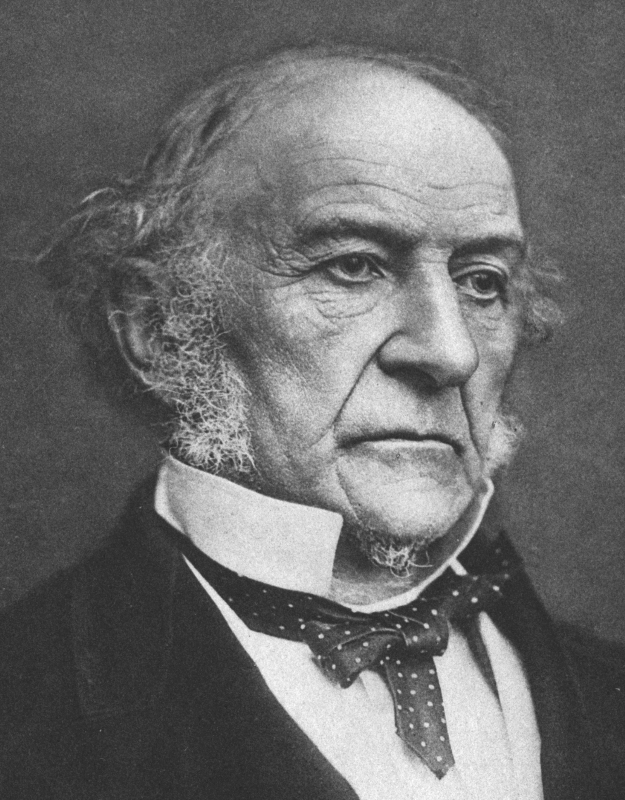
The Liberal Party Leader Gladstone
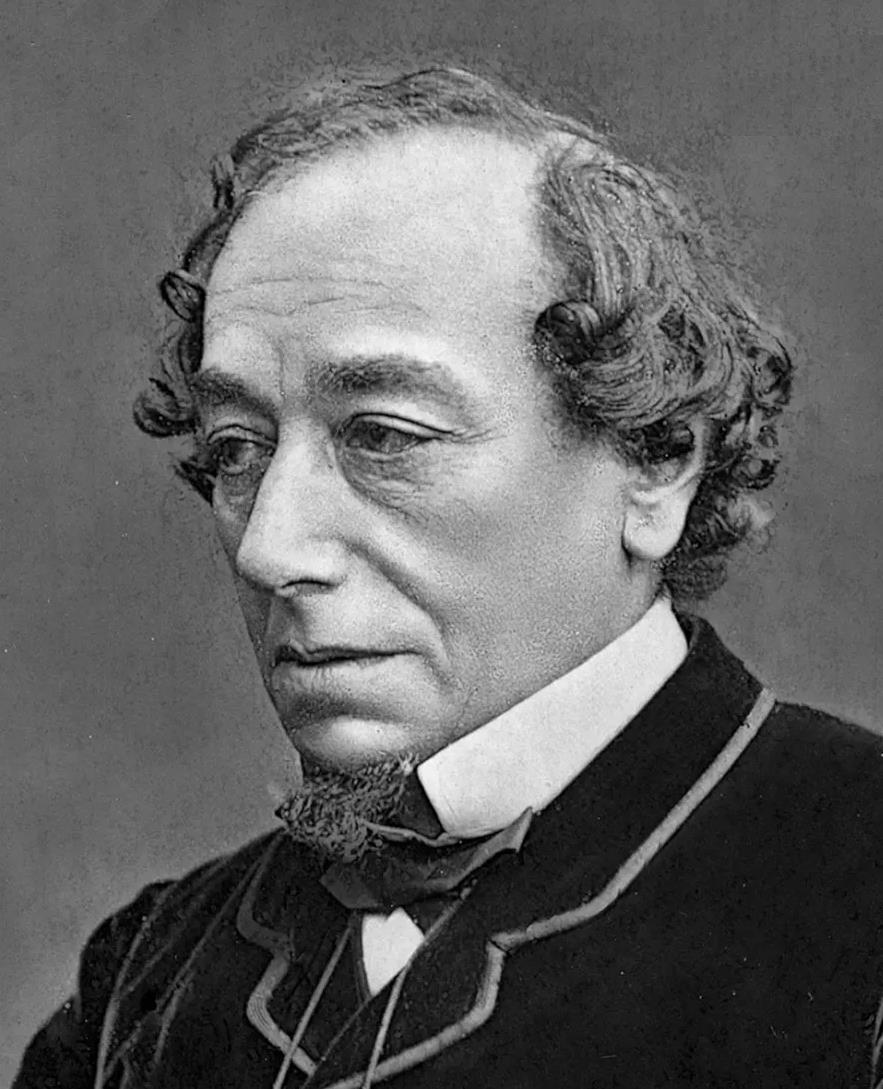
The Conservative Party Leader Disraeli
With the death of Disraeli in 1881, his place at the head of the
Conservative Party was taken by Salisbury, a member of the House of
Lords, who then alternated with Gladstone (who died in 1898) until
shortly after Victoria’s death in 1901.
The Irish Question
One of the issues greeting Victoria and her advisors or cabinet in her
first years was the matter of the Irish. Ireland was fervently
Catholic ... England and Scotland equally fervently Protestant.
Over the centuries the Irish, used to tribal government, were brought
into English feudalism – where the land came under the ownership of
English lords, mostly absentee landlords who remained in England while
they collected taxes and services from the Irish farmers ... offering
the Irish few (if any) benefits in return. The unfairness of all
this hit hard in the 1840s when a rapidly expanding Irish population –
which lived mostly off a diet of potatoes ... found themselves facing
starvation when a potato blight in 1845 destroyed the all-important
Irish potato crop. The Irish could have somehow survived the
worst of the crisis ... except that 1) the Corn Laws (grain laws)
passed in 1815 to protect English farming essentially made the import
of foreign grain virtually impossible and 2) Ireland still produced
enough food (grain, sheep, cattle, etc.) to have fed (meagerly) the
Irish population ... except that English landlords sold the Irish
production to foreign purchasers.
The plight of the Irish caused parliament finally to repeal the Corn
Laws the next year (1846) ... except the blight again destroyed the
potato crop. Food was brought in from India ... though too little
to hold off the starvation of Irish, which was now reaching major
proportions. Then in 1847 – and again in 1848 and 1849 – the
blight continued. And so did the starvation ... which given the
weakened condition of the Irish was now joined by the plague. In
those five years over 700,000 Irish died. And an equally
huge number escaped death only by emigrating (many to America).
Consequently, the crisis left a deep bitterness among the Irish towards
their English masters. Secret societies formed with a goal
similar to the ones on the European continent: national
independence.
It was not until Gladstone took office as British prime minister in
1868 that a serious effort was made to address the Irish
question. Gladstone pushed through an act disestablishing the
Anglican (Protestant) Church in Ireland, undertook land reform offering
greater opportunity for secure Irish ownership of their lands and
promising fairer rent payments. Sadly, English landlords would
often ignore these reforms. Thus over time a "Home Rule" movement
gathered momentum in Ireland ... demanding Irish self-rule in all
matters except foreign or imperial policy abroad. But efforts of
Gladstone in 1886 and 1893 to push such a policy through parliament
were both met by defeat. Thus as the 20th century approached, the
political situation in Ireland was becoming explosive.
|
The Irish Question
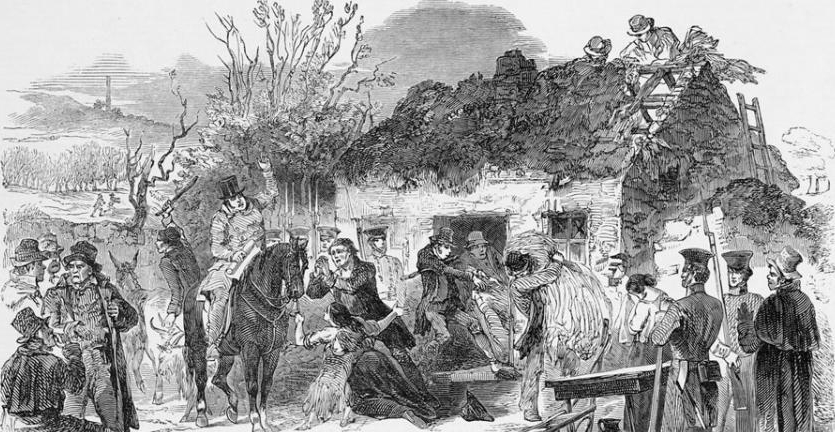
Destitute Irish peasants being evicted from their homes
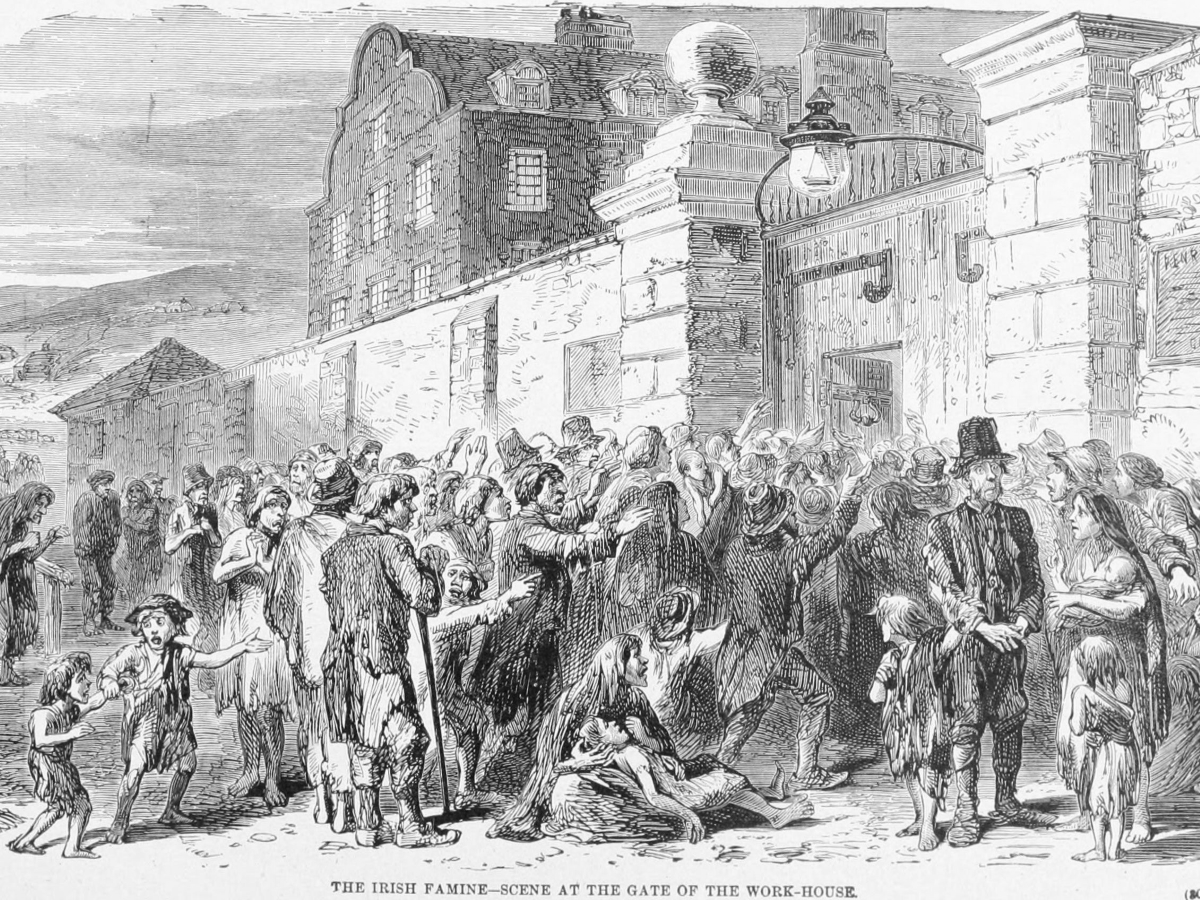
|
British democratic reform
It is important to note that Great Britain does not have some
great single document called a constitution, such as America has
possessed since 1787 and political reformers on the European continent
sought to put in place since the late 1700s. According to
constitutional theory in Great Britain, any act of Parliament has
constitutional authority. Thus when we talk of reform or
development of the British Constitution we are simply describing the
history of the various acts of Parliament that have shaped British
political society. Actually and most importantly, when the
British talk of their constitution they are describing not even just a
series of laws passed by Parliament but a larger moral-ethical sense
that underlies all British politics. It is this larger
moral-ethical sense by which they are "constituted" politically.
The Reform Act of 1832 had cleared up much of the political corruption
of the "rotten boroughs"3 generated by strong demographic changes in a
rapidly industrializing Britain and had brought an expansion in the
number of citizens entitled to vote. But that expansion reached
only to the level of the middle classes ... ignoring the right of
political participation of the even more rapidly expanding population
of the British rural and urban industrial working class. At first
the Chartist movement of the 1840s attempted to bring reforms to a more
fully democratic basis. But its seeming connection with the
continental events of 1848 merely brought stiff resistance to the
movement and it soon died away. But the Tory or Conservative
Prime Minister Disraeli took up the cause in 1867 ... just after the
Liberal Gladstone had succeeded the previous year in pushing through
the House of Commons a very weak reform measure. Disraeli’s
Reform Bill extended the vote to all householders and long-term renters
(except that it still exempted most miners and migratory farm workers).
Actually it was the Liberals who first benefitted from this expansion
of the electorate. With a majority in the House of Commons in
1868, Gladstone was able to begin to push through a series of pieces of
legislation providing for the secret rather than the oral ballot, the
expansion of national education (doubling the number of local schools),
and the reform of both the civil service and the military (appointment
by exam or proven merit ... not just personal connections!). Then
in 1874 a national election returned Disraeli and the Conservatives to
power ... and Disraeli continued the reform movement, focusing more on
the working conditions and hours of the British working classes.
In 1880 the national vote turned again in Gladstone’s favor, and he was
able in 1884 to extend the vote to the agricultural laborer. And
the next year his Liberal majority passed an act redesigning the
individual constituencies so that they represented more equitably the
spread of the British population. And thus it was that by the end
of the century Great Britain could claim to be truly a constitutional
democracy.
3A
district sending someone as a representative to Parliament … except
that the district demographically represents very few actual voters –
often only a particular individual or family.

Disraeli introduces his Representation of the People Act in Parliament - 1867
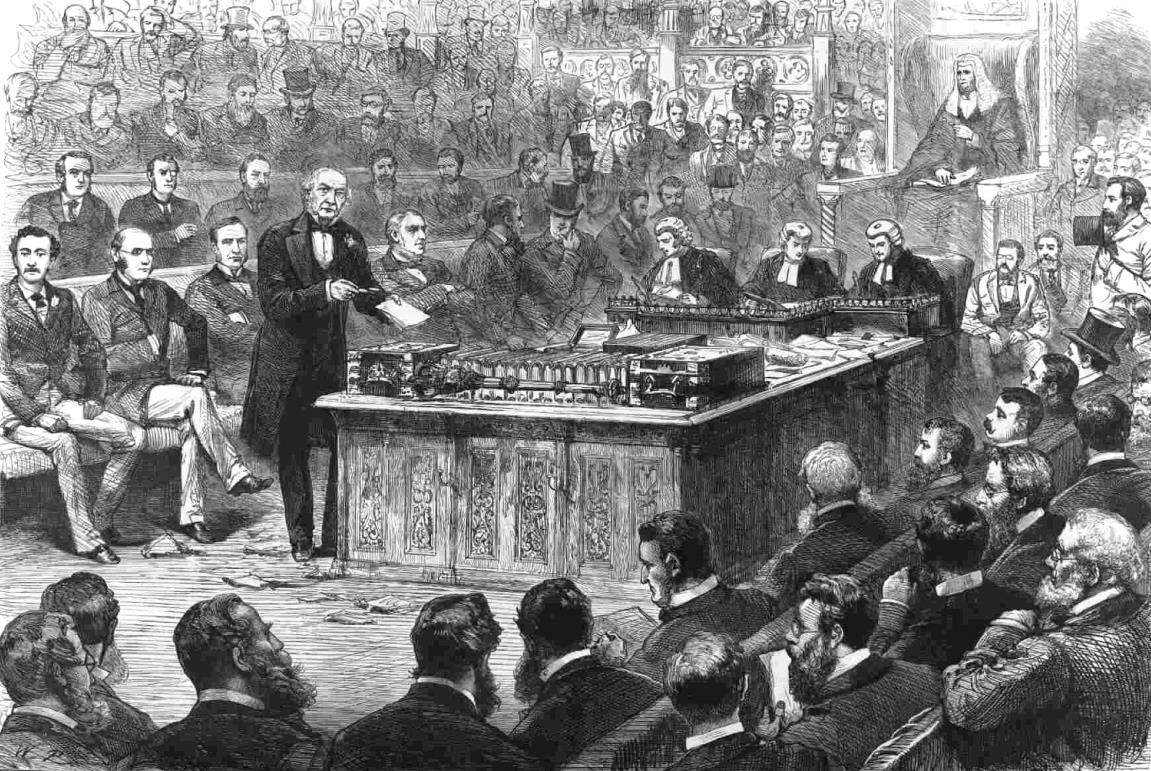
Gladstone introducing political reforms for Ireland - 1886
|
Autocracy
The word "autocrat" had originally been merely a Greek or Byzantine
title for "emperor."4 It conveyed pretty much the same political
sense that "divine rights" did among West Europe’s kings. Thus
the Russian Tsar proudly pronounced himself to be the Russian
Autocrat. But it was the actual behavior of the tsars over time
that gradually made "autocrat" to mean "despot" or even "cruel
dictator," someone possessing unquestioned or total power over his
people.
This had not always been the case. The build-up of Tsarist power
in Russia occurred in tandem with the development of the rise of
monarchical power to the west in Europe ... except that unlike Western
kingdoms, there were no other institutions such as the church or the
aristocracy offering some kind of check, even though small, on the
powers of the king. In Russia (as in England), the church did not
have a political base outside the reach of the tsar, and the tsar thus
controlled the personnel and activities of the church ... which existed
mostly to bring the Russian people to faithful support of the
autocratic tsar. Russia did have a small class of noblemen but
they had no independent power, the tsar being able to appoint them ...
but also depose them, not only from his imperial service but from even
their lands and titles. There existed few towns and thus hardly
anything constituting a Russian middle class.
Serfdom
The economy of Russia was nearly entirely agricultural, with all but 5
per cent of the population making up the peasant class. And even
this huge class had its earlier rights completely taken from it over
the course of the 1600s and 1700s – as the farmers were increasingly
restricted in their ability to move about in the quest for better
working conditions, being locked into place by law under landlords
given increasingly absolute control over their lives. Thus
gradually step by step they were turned into the semi-slave category of
"serf" ... at a time when West Europe was moving in the opposite
direction, gradually freeing up their serfs and recasting them as free
(peasant) farmers.
But the Napoleonic wars made very clear the dangers to Russia created
by this archaic social system. There was no question of loyalty
of the serfs to their tsar, Alexander I ... though their attitudes to their landlord
noblemen was a different matter (revolts were frequent). They
worshiped the tsar. But the tsar needed more than worship.
He needed a society with a strong industrial economy and a national
army of some modern (i.e., educated) sophistication. He had
neither.
Nicholas I (1825-1855)
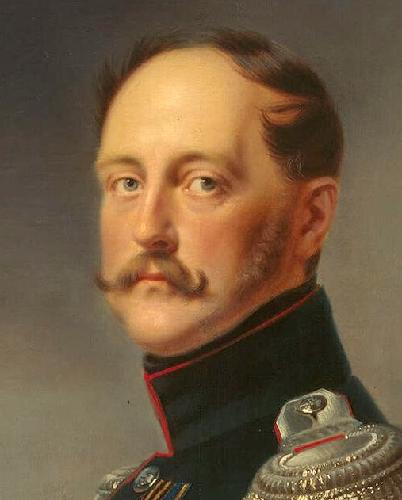 Alexander died suddenly in late 1825, just as the spirit of military
revolt was gathering momentum. His younger brother Constantine
had no desire to become tsar and stepped aside for the even younger
brother Nicholas ... upsetting the reformist soldiers who went into
full revolt in December at the news, thus the "Decembrist
Revolt." Nicholas crushed the Decemberists, setting the stage for
the rest of his repressive reign. One of the goals of the
Decembrists had been the ending of serfdom ... consequently making the
reform of serfdom one of the main objects of Nicholas’ wrath for the
duration of his reign. Constantly fearing reformist movements, he
tightened censorship of the press ... and cut back on national
education at both the local and university level, driving Russia even
deeper into intellectual darkness.
Alexander died suddenly in late 1825, just as the spirit of military
revolt was gathering momentum. His younger brother Constantine
had no desire to become tsar and stepped aside for the even younger
brother Nicholas ... upsetting the reformist soldiers who went into
full revolt in December at the news, thus the "Decembrist
Revolt." Nicholas crushed the Decemberists, setting the stage for
the rest of his repressive reign. One of the goals of the
Decembrists had been the ending of serfdom ... consequently making the
reform of serfdom one of the main objects of Nicholas’ wrath for the
duration of his reign. Constantly fearing reformist movements, he
tightened censorship of the press ... and cut back on national
education at both the local and university level, driving Russia even
deeper into intellectual darkness.
The backwardness of Russia finally registered itself fully during the
Crimean War ... when it seemed that all of Europe was lined up against
Nicholas. In short order not only did his huge military apparatus
disintegrate but his civil government itself seemed to collapse in
corruption. In the midst of the conflict he died of pneumonia ...
though there were rumors of suicide.
Alexander II (1855-1881)
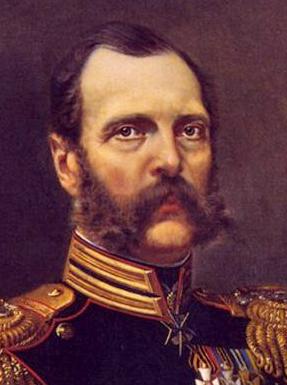 Nicholas’s son Alexander II quickly reversed course and headed Russia
down the path of reform in order to bring the country into the modern
era. In 1861 he authorized the emancipation of the serfs, then
moved to give Russia a more systematic legal system and a new judicial
system to supervise it, encouraged local self-government with his
zemstvo system, brought educational reform back into play ... and
instituted universal military training and service. His goal was
completely pragmatic, the strengthening of the social foundations of
Russia in the new modern era, and not particularly idealistic, for he
proved to be just as repressive as his forebears when it came to
organized attempts to oppose his rule. Indeed, when Polish
patriots rose up in 1863 against Russian rule, Alexander responded by
ending Poland’s separate status (Alexander was Polish king as well as
Russian tsar) and simply incorporated the Polish territory into
Russia. Nonetheless, he was still at work trying to reform
Russian politics in order to make it acceptable to reformist interests
when he was assassinated (1881).
Nicholas’s son Alexander II quickly reversed course and headed Russia
down the path of reform in order to bring the country into the modern
era. In 1861 he authorized the emancipation of the serfs, then
moved to give Russia a more systematic legal system and a new judicial
system to supervise it, encouraged local self-government with his
zemstvo system, brought educational reform back into play ... and
instituted universal military training and service. His goal was
completely pragmatic, the strengthening of the social foundations of
Russia in the new modern era, and not particularly idealistic, for he
proved to be just as repressive as his forebears when it came to
organized attempts to oppose his rule. Indeed, when Polish
patriots rose up in 1863 against Russian rule, Alexander responded by
ending Poland’s separate status (Alexander was Polish king as well as
Russian tsar) and simply incorporated the Polish territory into
Russia. Nonetheless, he was still at work trying to reform
Russian politics in order to make it acceptable to reformist interests
when he was assassinated (1881).
4From
the Greek – αuτόu (auto) meaning "self" and κράτωρ (krator) meaning
"ruler" or "governor" – someone given the power to make political
decisions independently or by his own authority.
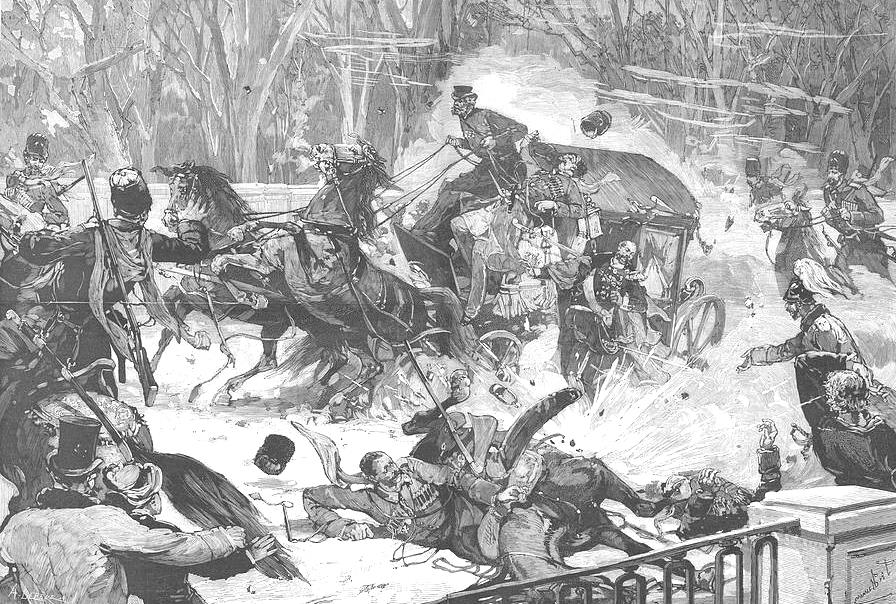
After numerous attempts on his life, the nihilist Norodnaya Volya ("People's Will) assassins succeeded in bombing Alexander's imperial train ... in the hopes of starting a revolution.
THE AMERICAN CIVIL WAR ...
BUT SUBSEQUENT RISE TO INDUSTRIAL GREATNESS |
|
The
issue of slavery
At the time of the creation of the American
Constitution, the issue of slavery and how slaves were to count in
deciding representation in the House of Representatives had put a
strain on the relations among the new states, divided on this issue
within the new union largely on a north-south basis. Southern
culture with its semi-feudal instincts had come to depend heavily on
slave labor ... but knew somehow it was morally wrong. Optimists
claimed that it would simply wither away by itself as an institution
over time. Some went so far as simply to free their slaves ...
usually as part of their will at death (Washington, for instance;
however, because of his huge debts, Jefferson did not). Indeed,
one of the last acts of the wartime Continental Congress before it
turned power over to the new Federal Congress in 1789 was to designate
the territories northwest of the Ohio River over to the French colonial
border along the Mississippi River to be forever free of slavery.
But the acquiring of new lands beyond the Mississippi with the
Louisiana Purchase from France in 1803 stirred the slavery issue to new
life. Southerners, whose cotton farming had exhausted the land,
were as interested in the territory west of the Mississippi as were the
northern farmers. Southerners fought to keep the new territories
open to slavery ... and won the idea in principle with the Missouri
Compromise of 1820. Entrance of new territories into the Union as
full states would occur in such a way that for every "free" state
brought in, the South would be entitled to enter a "slave" state ...
thus keeping a balance in numbers of free and slave states in the
Senate.
At this point the issue for Southerners was no longer a question of
when slavery might be ended (as it had elsewhere in the Western world)
but how it might be protected ... and even be justified morally.
Biblical testimony at this point was brought in to prove that somehow
slavery was even part of God’s intentions. The North of course
was horrified at this misuse of holy scripture. Thus a deep moral
divide, as well as an economic lifestyle divide, deepened further a
growing political-cultural split separating the North and the South.
Bleeding Kansas
In 1854 the decision to split the Nebraska
territory into two states, Nebraska in the North and Kansas in the
South, brought the issue to the boiling point. Nebraska would
clearly become a free state. But the idea of then making Kansas a
slave state brought such an angry reaction from Northerners that the
decision was made to let the people of Kansas decide their status
themselves. This was the signal of both sides to send masses of
settlers to Kansas to weigh the outcome in their favor ... producing in
Kansas itself a scene of bloody violence between armed defenders of one
group of settlers against the other. Soon the entire country was caught
up emotionally over this bitter issue.
|

A slave auction in Charleston

Pro-slavery "Border Ruffians" executing "Free State" (anti-slavery) Kansans - May 1858
|
The Lincoln-Douglas debates (1858)
The
nation watched closely the debates in Illinois between Abraham Lincoln
and Stephen Douglas as they competed for a U.S. Senate seat. The
leading U.S. Senator of the day, Douglas, pressed for tolerance on the
slavery issue; the rising Lincoln was certain that slavery would
destroy the Union if it were not abolished. Douglas won the
election ... but Lincoln won the heart of the new Republican Party ...
which two years later nominated him for the presidential race.
|
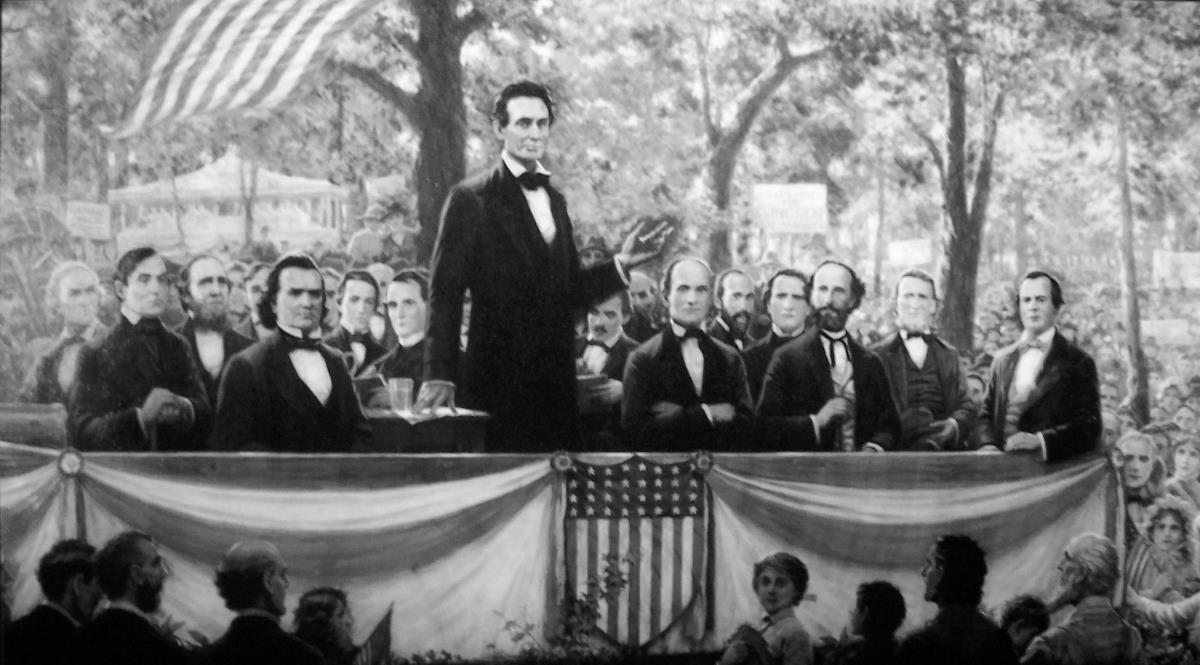
|
Lincoln ... the man
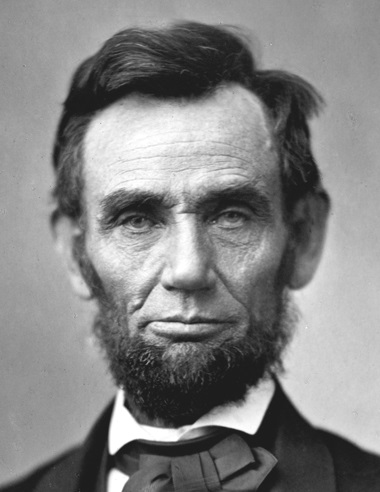 Lincoln was vastly more the man than his Republican Party opponents (at
first) believed him to be – supposing him to be just some kind of
"country boy." Thankfully for America, Lincoln was a truly great
leader, understanding deeply the importance of long-term grand strategy
– when the political world around him could think only in terms of
immediate tactics.
Lincoln was vastly more the man than his Republican Party opponents (at
first) believed him to be – supposing him to be just some kind of
"country boy." Thankfully for America, Lincoln was a truly great
leader, understanding deeply the importance of long-term grand strategy
– when the political world around him could think only in terms of
immediate tactics.
Previous presidents had merely kicked down the road the can of the
increasingly divisive slavery issue ... for those that came after them
to deal with. The political cost of bringing the matter to a
solution was just something previous presidents could not stomach. But
Lincoln knew God had called him to bring this horrible issue to full
resolution ... if the God-ordained Union (which Lincoln talked about
frequently) were to be saved.
Indeed, he drew closer and closer to God as the contest dragged on,
depending on God's counsel – and most frequently, God's counsel alone –
in directing what was becoming the bloodiest contest that the country
had ever seen (or seen even since then!).
Tragically, not achieving immediate success in their efforts to bring
matters to a resolution, the will of those around him (including his
wife) to press forward in the face of this challenge faltered
badly. Why not just give it up ... and let the South go its way?
The war itself (1861-1865).
The war was dragging on year after year, with Lincoln changing
commanding generals one after the other because of their rather
unexceptional service. Consequently, the North was tiring of the war
... and it took the incredible will of Lincoln not to call it quits and
simply let the South slip away.
Very sadly for the multitudes who died or were gravely wounded in
military service – with little to show for their supreme sacrifice – it
took Lincoln over two years to find military leaders (Ulysses S. Grant
and William Tecumseh Sherman) who understood that wars are not won by
great battles ... but only by the wearing down of the enemy's resolve
to continue. And that, not just a grand battle here and there, would
take many battles – and very unpleasant measures – to bring to actual
victory.
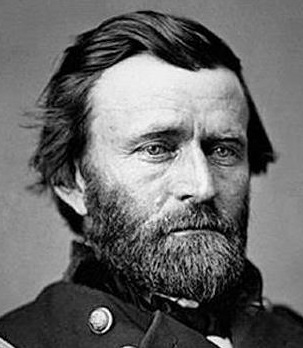
Ulysses S. Grant
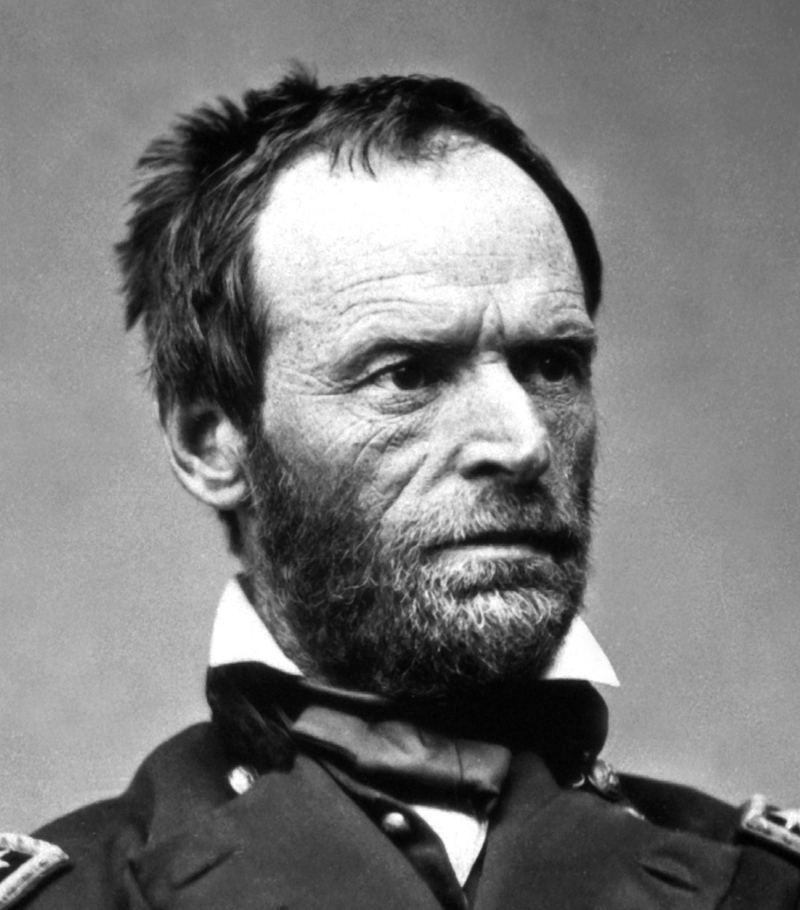
William Tecumseh Sherman
The
war was largely a defensive one for the South, more easily
understandable and thus easier to conduct ... thus defensive except in
the one instance when Southern General Robert E. Lee invaded the North
– but was soundly defeated at the Battle of Gettysburg (July 1963) in
Pennsylvania. This Northern victory certainly picked up the
wearied spirit of the North ... though not greatly.
"Victory" was not yet in the picture ... until General Grant took over
the Northern forces. At this point Lee discovered that he was up
against an opponent who, though not a brilliant tactician, was a
relentless bulldog that was determined to push the South relentlessly
... to the point of exhaustion. And that point came at Appomattox
in April of 1865. The South finally had to bow in total
defeat. The Union was saved ... and the issue of slavery was
finally resolved. |
|
Lincoln's famous 2nd Inaugural Address (1865)
With that victory in the making, Lincoln was faced with the challenge
of putting the Union back together as a truly unified community ...
bringing former slaves into the full responsibilities of citizenship,
and re-integrating into the community those who had fought so hard to
preserve that slavery. Lincoln – and the country – would need
God's help ... as Lincoln made very clear in his new inaugural address,
issued in taking up his second term as U.S. president.
It is well worth quoting ... for he stated very clearly the
moral-spiritual challenge facing the nation – the likes of which has
not been heard from an American presidential leader ever since ... for
it was very much more than just a fine speech. It was a sermon to
a hurting nation:
...
Neither party expected for the war, the magnitude, or the duration,
which it has already attained. Neither anticipated that the cause
of the conflict might cease with, or even before, the conflict itself
should cease. Each looked for an easier triumph, and a result
less fundamental and astounding. Both read the same Bible, and
pray to the same God; and each invokes His aid against the other.
It may seem strange that any men should dare to ask a just God's
assistance in wringing their bread from the sweat of other men's faces;
but let us judge not that we be not judged. The prayers of both
could not be answered; that of neither has been answered fully. The
Almighty has His own purposes.
He then explained that slavery was one of those offenses against God
that God would allow – but only until such time as he was ready to
exact his judgment, through the terrible war they had been
experiencing.
If
we shall suppose that American Slavery is one of those offences which,
in the providence of God, must needs come, but which, having continued
through His appointed time, He now wills to remove, and that He gives
to both North and South, this terrible war, as the woe due to those by
whom the offence came, shall we discern therein any departure from
those divine attributes which the believers in a Living God always
ascribe to Him? Fondly do we hope – fervently do we pray – that
this mighty scourge of war may speedily pass away. Yet, if God
wills that it continue, until all the wealth piled by the bond man's
two hundred and fifty years of unrequited toil shall be sunk, and until
every drop of blood drawn with the lash, shall be paid by another drawn
with the sword, as was said three thousand years ago, so still it must
be said the judgments of the Lord, are true and righteous altogether.
He concluded:
With
malice toward none; with charity for all; with a firmness in the right,
as God gives us to see the right, let us strive on to finish the work
we are in; to bind up the nation's wounds; to care for him who shall
have borne the battle, and for his widow, and his orphan – to do all
which may achieve and cherish a just, and a lasting peace, among
ourselves, and with all nations.
Lincoln is assassinated
Then tragically, Lincoln was shot and killed only a couple of weeks
later by a Southerner who thought he was doing the defeated South a
great favor in taking down their primary adversary. With that
bullet, any thought of a much-needed cultural-moral reconciliation
between the North and the South disappeared.
Equally tragically (for both North and South), those that came after
Lincoln had neither the moral courage nor the political leverage to
move the country forward to Lincoln's plan for restored national
unity. Instead, Congress's Radical Republicans undertook
self-righteous measures designed to keep former Confederates powerless,
measures which merely drove the country more deeply into a
political-moral standoff. This would do neither North nor South
any good.
 For more on The American Civil War For more on The American Civil War
|
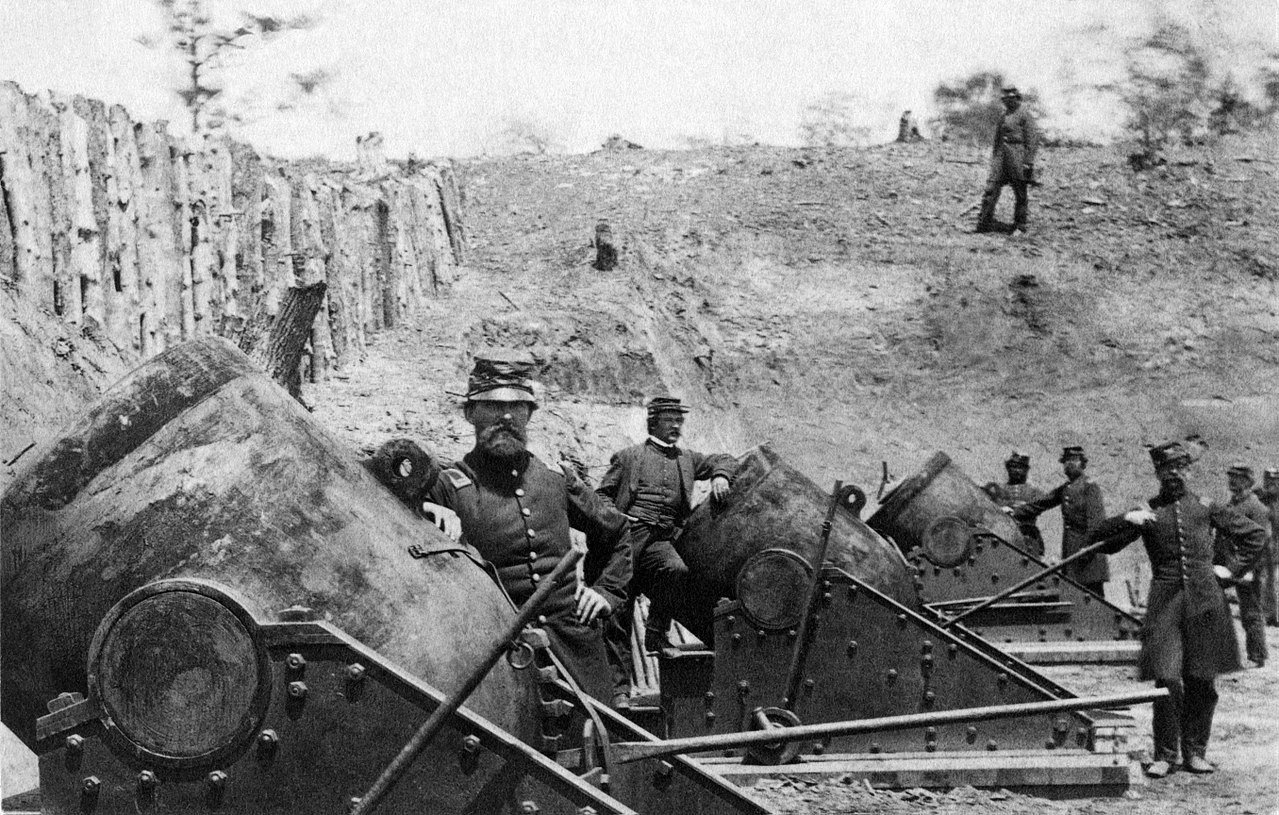
Union artillery at the Battle of Yorktown -1862
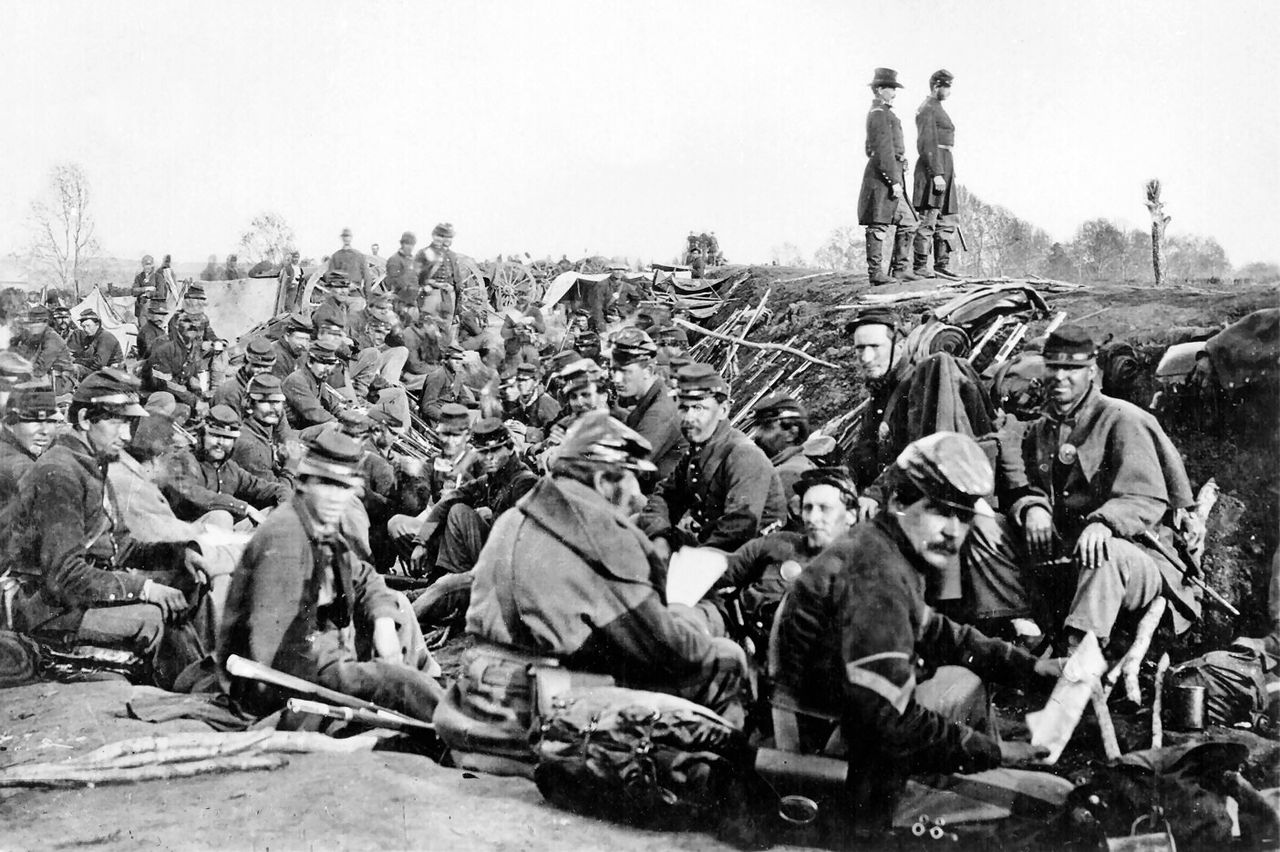
Union troops prior to the third battle with the Confederates at Fredericksburg - 1863
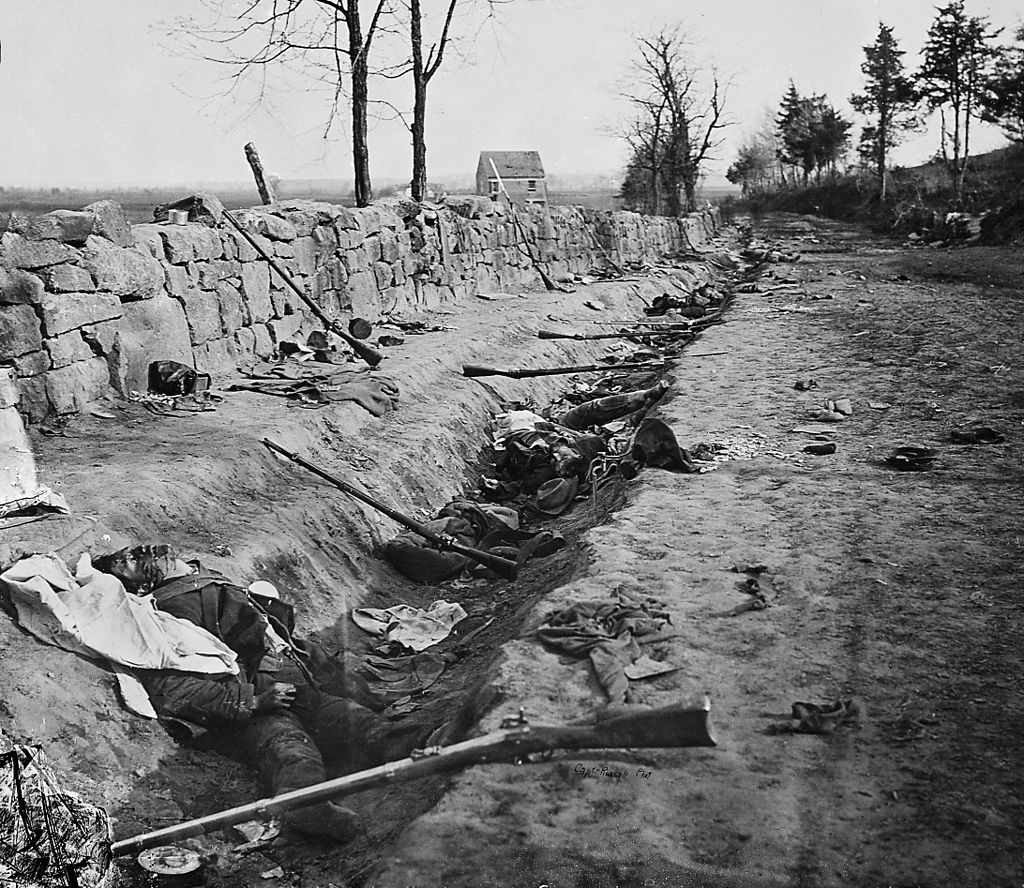
Confederate dead at Mary's Heights overlooking Fredericksburg - 1863
|
Efforts to impeach the new president
In accordance with this new moral self-appointment of the Radicals,
impeachment charges were leveled at President Andrew Johnson (the
former vice president) in an effort to remove him from power … because
he was considered too soft on the South – when he tried to follow
Lincoln's efforts to reunite politically the South with the North,
rather than punish the South.
The use of the impeachment instrument was designed for very
exceptional circumstances (a president actually committing a serious
federal crime) rather than just for political purposes. This was
its first use … though hardly over a criminal matter. This was
simply very bad political morality in action. Thankfully, the
effort to chase Johnson from office would fall just short of the
necessary two-thirds vote of the Senate. But it would leave
Johnson powerless as president thereafter.
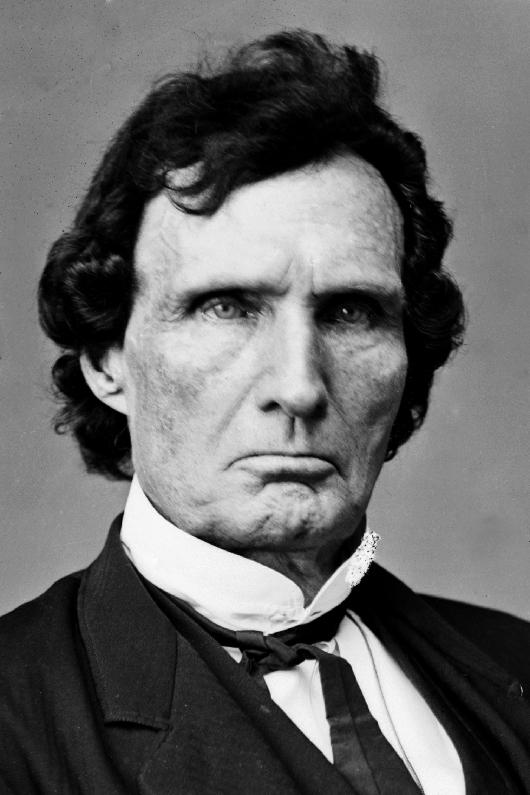
Leaders of the Radical Republicans, Thaddeus
Stevens (above) and Charles Sumner (below) ... who led the anti-Johnson impeachment efforts
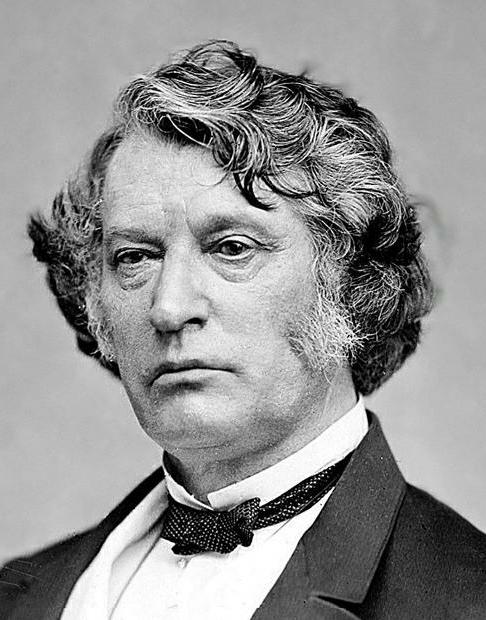
This
powerful political tool would not be put to use again until a century
later (the effort to drive Nixon from the White House) … and then –
most tragically – would become part of Congress's political weaponry
used quite frequently by the president's political opposition in
Congress … a sign of the moral decline of Washington politics.
But more about that later!
But peace weakened the resolve of
the North to press the South to implement full equality for all of its
citizens, Black as well as Whites. And in subtle ways the South
found ways of putting Southern Blacks under complete political,
economic and cultural restraint ... leaving a huge social problem yet
unresolved.
The after-effects of the war
However,
peace ultimately weakened the resolve of the North to continue to press
the South to implement full equality for all of its citizens, Black and
White. And in subtle ways the South gradually found ways of
putting Southern Blacks back under complete political, economic and
cultural restraint ... leaving a huge social problem yet unresolved.
But at this point, the North was busy with its attention focused
elsewhere, opening more lands for settlement along the Western frontier
and continuing the rapid development in the East of the American
industrialization that the war had promoted heavily. The South
meanwhile sunk back into its semi-feudal ways, with the old families
still dominating life from behind the political scenes and with a
resentful population of poor Whites determined to keep Southern Blacks
fully oppressed. Thus the opportunity produced by the Civil War
to bring the South into harmony with Northern democratic and
egalitarian ideals was lost ... for a full century.
But the social scene in the North was not all that serene either.
The frontier with the Indians was closing … and there was no more good,
cheap land for the expanding Anglo population to move to. The
squeeze was on for younger sons to find a way to make their own
fortunes … with most of them having to move to the urban-industrial
East to find employment in the mines and manufacturing plants, where
salaries barely covered life’s most basic expenses. This occurred
at the same time that multitudes of immigrants were leaving Europe
behind to come to America in the search for the same manufacturing and
mining jobs. Anglo America balked at how this was changing the
country from a largely rural nation to one where urban life was fast
taking the social lead ... and with all sorts of inhabitants (and
corrupt political bosses and urban governments) that made urban America
feel "foreign."
|
|
America’s rise as an industrial giant
But this was also
indicative of the deep changes going on within the American
economy. America continued to possessive vast wealth in its
extensive farmlands and its multitude of small rural towns. And
America’s huge railroad and shipping infrastructure made for an
extremely efficient and powerful market for agricultural goods.
But its cities were also amassing great wealth as they turned to the
manufacture of a vast array of new machines that greatly energized the
American economy … and the mining of iron, coal and even oil to answer
the voracious appetites for raw materials of these mammoth
manufacturing operations. Indeed, so great was the industrial
growth of America during this time that by 1914 and the outbreak of the
European ‘Great War’ (World War One), America alone produced one-third
of the world’s total industrial wealth … more than Britain, Germany and
France combined.
The "captains" (some would say "robber barons") of American
industry
Behind this growth was not a government (as in Europe,
mostly) but a small group of powerful individual capitalists, who
developed the ability to gather vast sums of money to undertake
industrial investment a massive scale.
Cornelius Vanderbilt grew
a business from a small ferry service (from New Jersey to New York
City) by the mid-1800s to a massive steamship corporation … and then
combining a number of railroad companies operating into the New York
Central Railroad.5 Competing with him in
the 1870s were Jay Gould and James Fisk … attempting a similar hold
over much of the East’s railroad business.
Then there was Andrew
Carnegie who came from Scotland to America in 1848 as a youth, taking
whatever jobs he could to pay the bills … but advancing himself by
teaching himself new skills that caught the attention of American
businessmen, which in turn led him into deep investment in the steel
business – until he became by the end of the 1800s the owner and
director of America’s largest steel-producing operation.
This is
turn was bought out by the most powerful banker in American history,
J.P. Morgan … who went on to build a vast financial-industrial empire …
that was called on twice (1895 and 1907) by America’s presidents to
save the country from economic collapse.
Then there was indeed
the richest man in American history, John D. Rockefeller, who started
small in the oil business (originally focused on making the kerosene
that would replace the whale oil lamps used in all American homes) that
came at one point (the 1870s) to control 90% of America’s oil industry
… before his business was forced in 1911 by the Supreme Court to break
itself into 34 independent and thus competing oil companies – under the
impetus of America’s "antitrust" crusade that broke out exactly because
of Rockefeller’s monopolistic position in this vital industry.
Nonetheless Rockefeller would remain America’s wealthiest man in its
history.
5By this time, he had made himself into the second richest man in American history!

Vanderbilt

Carnegie

Morgan
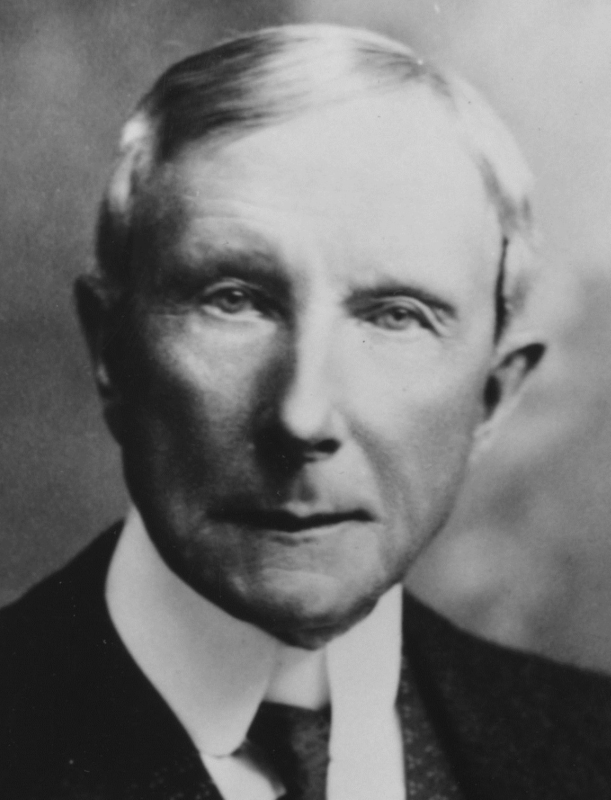
Rockefeller
THE THIRD REPUBLIC OF FRANCE |
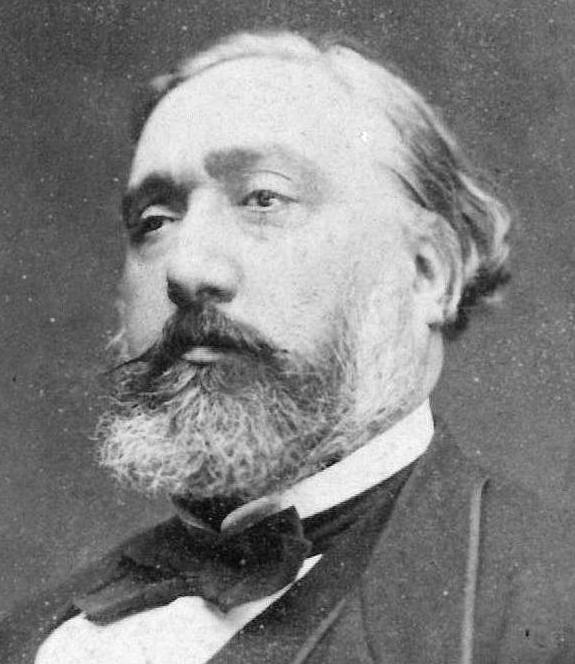 With
Napoleon III’s capture by German troops in the battle of Sedan, French
government simply melted away. Hearing the news of his capture a
Paris mob descended on the French Assembly demanding the formation of a
new republic. It was assumed that this would rally the French and
reverse the direction the war was going. But stunningly quickly
the German troops were able to march on and surround Paris.
Léon Gambetta was able to escape the encirclement (hot air balloon) and
organize a new French army. But at Metz another huge French army
was forced to surrender ... and Gambetta’s forces were unable to break
the German encirclement of Paris. With
Napoleon III’s capture by German troops in the battle of Sedan, French
government simply melted away. Hearing the news of his capture a
Paris mob descended on the French Assembly demanding the formation of a
new republic. It was assumed that this would rally the French and
reverse the direction the war was going. But stunningly quickly
the German troops were able to march on and surround Paris.
Léon Gambetta was able to escape the encirclement (hot air balloon) and
organize a new French army. But at Metz another huge French army
was forced to surrender ... and Gambetta’s forces were unable to break
the German encirclement of Paris.
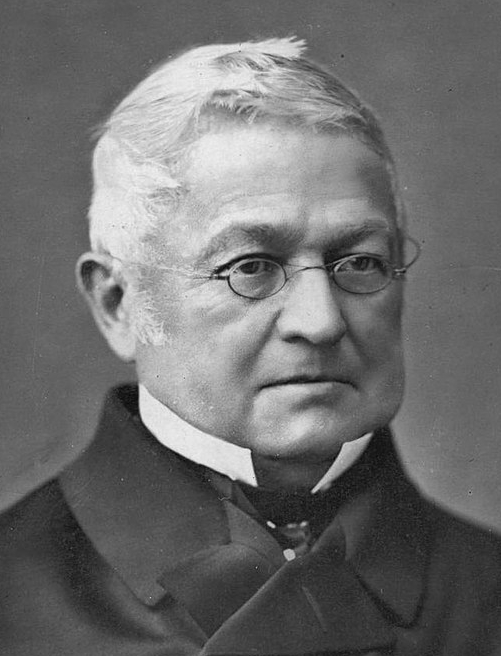 A French Provisional Government was formed in the south of France at
Bordeaux to try to carry on French government ... and secure peace
terms with Germany. But the delegates that gathered were hotly
divided as to what shape the new government should take. Only
about a third of the members were in favor of a republic. The
others favored the restoration of the monarchy ... but were hotly
divided as to whether the new king should be a Bourbon or an
Orleanist. Deadlocked over the monarchy issue, the decision
was made simply to stay temporarily with the idea of a new republic
(the third such republic) under the presidency of Adolphe Thiers ... until the Bourbon-Orleanist dispute could
be settled.6 For the time being, peace negotiations were opened up
with the Germans and the new National Assembly moved itself to
Versailles, just outside German-encircled Paris.
A French Provisional Government was formed in the south of France at
Bordeaux to try to carry on French government ... and secure peace
terms with Germany. But the delegates that gathered were hotly
divided as to what shape the new government should take. Only
about a third of the members were in favor of a republic. The
others favored the restoration of the monarchy ... but were hotly
divided as to whether the new king should be a Bourbon or an
Orleanist. Deadlocked over the monarchy issue, the decision
was made simply to stay temporarily with the idea of a new republic
(the third such republic) under the presidency of Adolphe Thiers ... until the Bourbon-Orleanist dispute could
be settled.6 For the time being, peace negotiations were opened up
with the Germans and the new National Assembly moved itself to
Versailles, just outside German-encircled Paris.
The Paris Commune
Meanwhile in Paris itself, conditions were breaking down as the population ran
out of food and medicine. Anger developed quickly in Paris over
the "betrayal" of the new government which had failed them in war and
seemed to be ready to impose a monarchy over them in peace. When
soldiers were sent into Paris to secure cannon lest they fall into the
hands of the Paris mob, they were fiercely resisted ... and the street
barricades went up announcing Paris's refusal to acknowledge the new
Versailles government. Instead rebel leaders declared Paris to be
an autonomous Commune (late March 1871) ... defended by Paris’s own
National Guard. France had fallen into civil war.
The next six weeks proved to be bloodier than had been the war against
the Germans, as French national troops fought their way into Paris
defended by members of the Paris National Guard. The "Bloody
Week" of May (21-28) saw much of Paris burned and countless thousands
killed in battle and even executed in surrender.
Eventually the
Commune was suppressed ... with 30,000 people having been killed,
countless others wounded and perhaps 50,00 executed or imprisoned ...
7,000 of those exiled to the prison colony of New Caledonia in the
Pacific. Thousands of other communards
were able to escape from France to Switzerland, Belgium and England.
6Interestingly,
the "temporary" Third Republic would last from 1870 all the way up
until 1940 ... when Hitler forced France to submit to German authority
... leaving only a smaller "French State" at Vichy to govern the South
of France (1940-1944).
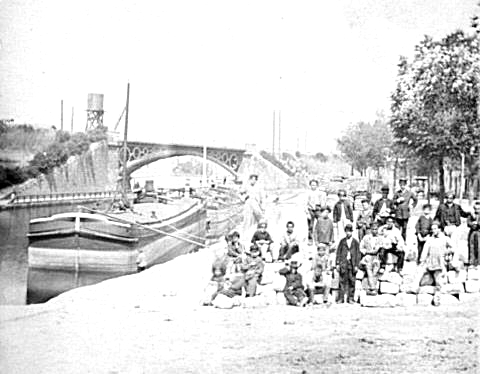
Some of the "Communards" rebelling against the French government

Blockades (made up of street paving stones mostly) set up in Paris to defend the Commune

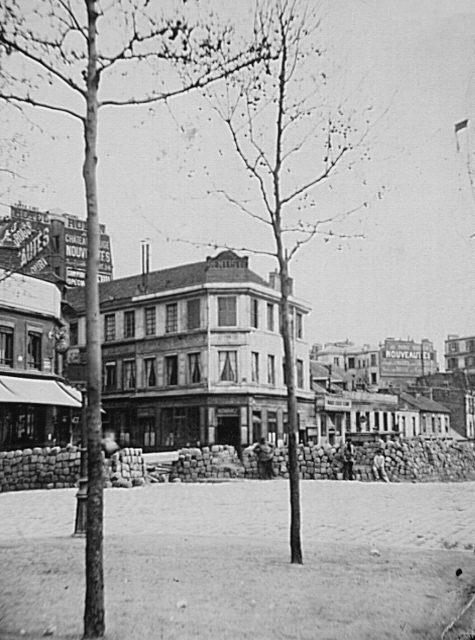

Forces defending the French government

Some of the destruction involved in crushing the Commune
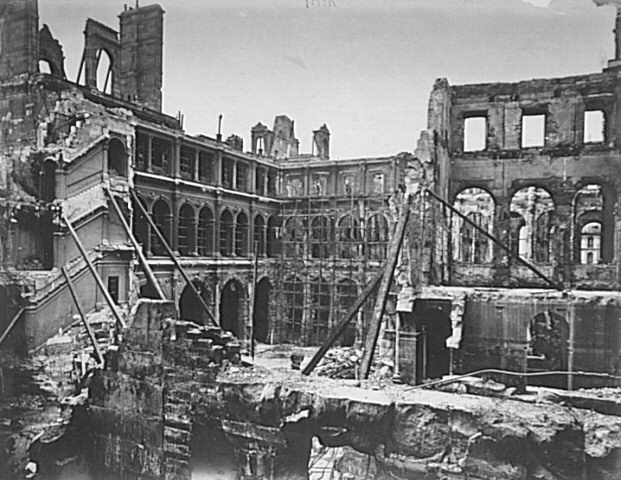

The Hôtel de Ville (Paris's Town Hall) after the crushing of the Commune
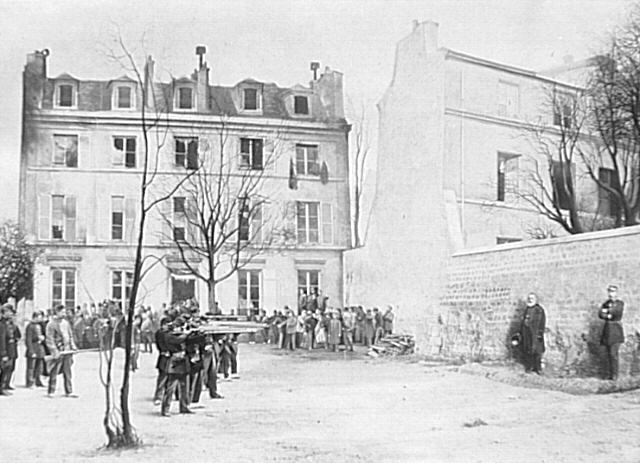
|
The struggles of the new Third Republic
Eventually the Third Republic was able to work its way past the
divisions among the monarchists to draw up a new constitution (1875)
which provided for a national President, a Chamber of Deputies elected
by universal manhood suffrage and a Senate whose members were in part
appointed for life and the rest selected by various regional electoral
colleges. As it turned out, the Chamber was strongly republican
in character and the Senate monarchist ... though the Chamber itself
was always divided among small political groups of one or another
ideological bent or just personal loyalty to some particular political
figure. Consequently, French politics during the Third Republic
would remain unsteady ... yet held together at a higher level by a
burning sense of French nationalism.
|

Go on to the next section: Western Imperialism
 Miles
H. Hodges Miles
H. Hodges
| | | | | | |


 The French Second Empire
The French Second Empire
 The Founding of the Italian Nation-State
The Founding of the Italian Nation-State The American Civil War ... but
The American Civil War ... but For more on Louis Napoleon
For more on Louis Napoleon































































